The School of Medicine Dean weighed in on parechovirus
The CDC shows that multiple health systems are reporting a potential increase in serious cases of parechovirus. While many kids experience mild symptoms, babies younger than three months old may develop severe symptoms.
UMKC School of Medicine Dean Mary Anne Jackson, M.D. spoke with CBS News about the virus and what parents should know. Read more
Jul 28, 2022
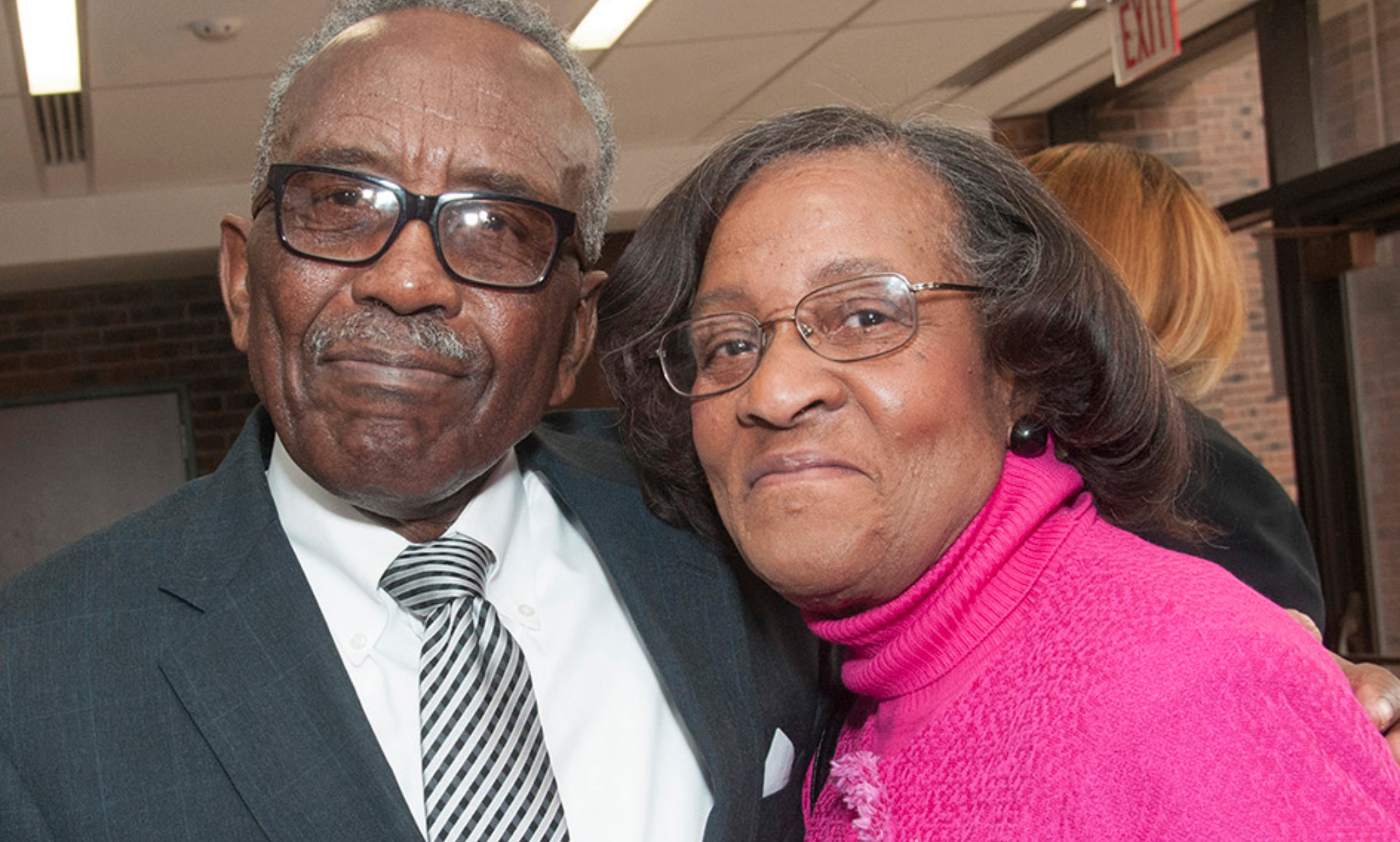
School of Medicine’s first associate dean for minority affairs
Reaner Shannon, Ph.D. (M.A. ’78, Ph.D. ’83), part of the UMKC School of Medicine for 34 years, died July 13 at the age of 85.
Shannon began her career at the school as the main research lab technologist. In 1990, she left the lab to become director of the minority affairs office at the school, becoming the school’s first associate dean for minority affairs in 1998, a post she held until she retired in 2008. That year, she was presented the Bill French Alumni Service Award.
Shannon and her husband, Henry Shannon, established the Dr. Reaner and Mr. Henry Shannon Lectureship in Minority Health in 2006. Speakers of local and national interest have presented the lecture each February since in conjunction with Black History Month, focusing on timely topics that impact underserved and minority communities.
Mike Weaver, M.D., ’77, a member of the UMKC School of Medicine’s first graduating class to complete the school’s six-year program, delivered the 2022 lecture.
"Reaner Shannon was an insightful, compassionate, and tireless advocate for URiM (Underrepresented in Medicine) students, who was well ahead of her time. Long before it was common to talk about health equity, Dr. Shannon recognized that the lack of attention to minority health was creating an ongoing healthcare disparities crisis. She raised awareness on these issues and encouraged the School of Medicine to bring these topics to medical education," Weaver said. "The Dr. Reaner and Mr. Henry Shannon Endowed Lectureship in Minority Health is a testament to that vision and her intention to ensure that medical students at UMKC would forever have access to thought leaders in this area."
"She recognized that URiM students experience unique challenges in medical school, and she was a mentor who helped hundreds of students mitigate those challenges and successfully graduate," he continued. "I am very grateful that I was one of those students when I met her back in 1973. She helped me navigate some difficult situations, was affirming, and always had an open door and a warm smile."
Shannon established the UMKC School of Medicine Diversity, Equity, and Inclusion Council in 2001 to promote a diverse, nondiscriminatory learning and working environment for the school. It was charged with promoting cultural competency, awareness, inclusion, respect and equity through education, training, programing and advancement. The Council hosts a Diversity Symposium bringing together all departments across the School of Medicine to create goals and recognize existing efforts towards more diverse, equitable, and inclusive environments and work execution.
Shannon also launched Saturday Academy, a free program designed to spark interest in and help prepare young people for potential careers in health care. The program provides students in grades six through 12 with two and a half hours of classes that focus on math and science as well as ACT prep.
2022 class of Summer Scholars view an intubation demonstration.
She started a similar program, Summer Scholars, that invites minority and disadvantaged students in the Kansas City metropolitan area to take part in a two-week session each July. They receive daily instruction in academic areas such as chemistry and language arts, and study anatomy and physiology in the school’s cadaver lab. Summer Scholars has grown from a single two-week experience for local underserved high school students that Shannon began more than 40 years ago to four different programs provided for high school and undergraduate college students.
“I’d like to think I made an impact in the lives of those students who, in some cases, might not have known that studying medicine was even an option,” she said when presented with the Bill French award. “It was important for me to build in the lives of young people, to help them in any way that I could to succeed.”
Shannon also served on the board of directors for the Black Health Care Coalition and the Edgar Snow Foundation.
Jul 27, 2022
Former faculty member at University of Tennessee served as associate dean for equity and inclusion in the College of Social Work there.
J. Camille Hall, Ph.D., LCSW, has been appointed as the new vice chancellor for diversity and inclusion at UMKC. She will begin work here Aug. 22.
Hall comes to UMKC from the University of Tennessee-Knoxville, where she has served as a tenured professor and associate dean for equity and inclusion in the College of Social Work. Her research focuses on risk and resilience among Black Americans and multicultural competence. Her more than 25 years of administrative and clinical social work experience includes private practice and service as a clinical social work officer in the United States Army Reserve.
“I am excited to become a part of the campus and Kansas City communities and am honored to be selected to lead our inclusion and diversity efforts,” Hall said. “I am impressed by the depth of expertise, commitment and community engagement shown by UMKC stakeholders towards inclusive excellence. My goal is to foster a community-developed vision for inclusion and diversity that ensures all members of the UMKC community can bring their authentic selves to campus every day. I will work to build strong relationships based on trust, honesty and transparency to advance this important work.”
J.Camille Hall
Hall received bachelor’s and master’s degrees in Social Work from New Mexico State University, Las Cruces; and a Ph.D. from Smith College, Northampton, Massachusetts. She is a 2011 Higher Education Resource Services Women's Leadership Institute alumna and a member of the National Coalition of 100 Black Women.
“As vice chancellor, Dr. Hall will play a vitally important role in the UMKC leadership team,” said Chancellor Mauli Agrawal. “She will guide the work we all share in maintaining and enhancing the commitment to diversity, equity and inclusion that is thoroughly woven into the fabric of our university community.”
The UMKC commitment to diversity and inclusion is featured prominently in the university’s Mission Statement and Statement of Values, and is one of five pillars in the UMKC Strategic Plan. The UMKC Division of Diversity and Inclusion promotes diversity and inclusion as a critical factor for student, staff and faculty success, and provides leadership and guidance to campus-wide efforts to ensure that commitment continues to be an important driver of excellence in higher education.
The division guides the work of multiple campus initiatives, including the Chancellor’s Diversity Council, the Diversity Advocates program and the Faculty Diversity Dialogues series. The division also sponsors multiple community engagement programs such as the Critical Conversations series, the Martin Luther King Jr., Pride and César Chávez lectures, and the Women of Color Leadership Conference.
Jul 25, 2022
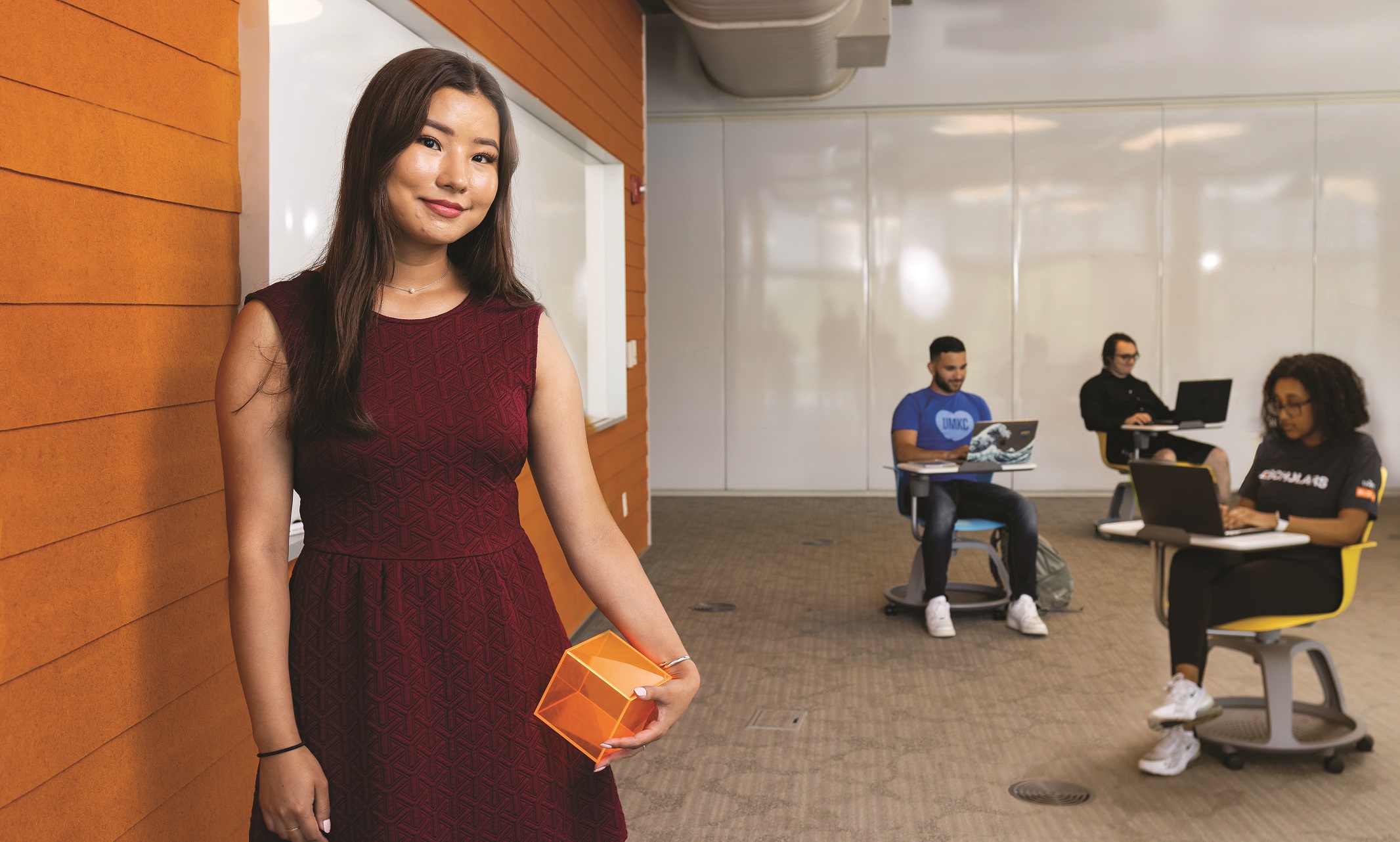
Upholding Henry’s vision for the Bloch School
Building on the Bloch School’s legacy of serving Kansas City, the Henry W. Bloch School of Management has more than doubled its enrollment of graduate students from underrepresented groups in the last four years.
Between 2017 and 2021, enrollment in Bloch graduate degree programs increased 170% for Asian students, 148% for Black students and 127% for Hispanic students.
“We want to be Kansas City’s business school. As part of this, we have focused on community engagement, outreach, and finding ways to make our programs more accessible and flexible. These efforts are helping us meet needs throughout our entire community for engaging, cutting-edge business education,” said Dean Brian Klaas.
Addressing the needs of students from across our entire community has been a long-standing priority at Bloch, dating back to Henry W. Bloch’s original 1986 endowment. Lately, 21st century tools have allowed the school to broaden its reach and become more accessible to students throughout this community.
The school has implemented several new tools that have created expanded opportunities, such as flexible class modality for people with unpredictable work hours or those with childcare responsibilities.
“We’ve found that moving from a largely on-campus and traditional program to more blended offerings has increased our ability to serve many working professionals and others who are juggling a complex life with a range of work and family obligations,” Klaas said.
According to Klaas, flexible classes have allowed students to find their own comfort levels while deciding which modalities work best for them.
Brian Anderson, associate dean of the Bloch School and associate professor of entrepreneurship, said by allowing students to take some classes remotely or on a hybrid model, or take extended periods off, the school has been able to expand its reach and appeal.
“Having a full range of modalities allows us to build engaging and inclusive classroom experiences that can better serve all of those within the Kansas City community,” Anderson said.
In addition to offering flexible classroom modalities, the school has also used digital marketing tools to share opportunities with a larger and a more diverse community.
“Back in the day, we often relied on word-of-mouth, networking and events to share information about our programs,” Klaas said. “Now with digital marketing and social media, we have more tools and more capacity to connect with candidates throughout this community. We are better positioned to highlight for candidates throughout this community the opportunities available here at Bloch and programs that could help meet their needs and achieve their goals.”
Technology and outreach aren’t the only factors that have played a role. One-on-one contact has been just as important.
“We aspire to offer concierge-level service for every student. Not everyone comes with that built-in network that some students do. We’re here to give you that network and then show you how to continue to build it,” Anderson said.
The resulting network needs to be diverse as well. Toward that end, the Bloch School has expanded experiential learning opportunities to organizations with diverse leadership and/or a mission to assist underserved communities. Students from Bloch graduate programs are working closely with organizations such as AltCap, Pipeline and The Porter House KC, participating on faculty-led consulting teams to provide services and assistance to entrepreneurs from underserved communities.
The Porter House KC was co-founded by Daniel Smith, who currently teaches a course at the Bloch School. Smith said it’s important to be intentional about the different needs students from underrepresented backgrounds bring with them to their MBA experience – and it’s important for students to get an opportunity to see themselves represented in the organizations they work with.
“It requires encouragement, doubling down and going into spaces universities don’t typically go into,” Smith said. “It’s beneficial for the university and the community they serve. The ability to counsel and walk alongside these students is invaluable.”
Melissa Vincent is the executive director of Pipeline Entrepreneurs, a professional development network for high-growth entrepreneurs in Kansas City. In an effort to better support entrepreneurs from underserved backgrounds, Pipeline recently created Pathfinder, a year-long virtual program partnered with Bloch’s E-Scholars program to help earlier-stage businesses develop resources and gain traction.
“We recognize that it’s not an even playing field right now in multiple senses,” Vincent said. “One of those is access to networks, resources and programming. The other side is funding. In order to be able to really change the trajectory for underserved entrepreneurs, we have to answer both sides of that equation.”
“At the Bloch School, they truly care about training their students, and with that comes a genuine belief that their students have the capacity to contribute to the community regardless of their age.” - Jennifer Alexander
Vincent said that the combination of Bloch education and outside support from organizations like Pipeline can be a winning combination for early-stage entrepreneurs, especially those from underserved communities.
Another key part of the Bloch School network is Central Exchange. Central Exchange was established as a non-profit in 1978 and since then has played a critical role in developing and offering professional development and leadership experiences for women in the region. It works closely with corporate members to provide impactful leadership development for women at key junctures in their career.
Throughout the past few years, the Bloch School has been partnering closely with Central Exchange. Assistant Teaching Professor Ann Hackett provides leadership and strategy support for Central Exchange as part of her role at the Bloch School, working to expand leadership development opportunities for women in the region, including students in the Bloch School. The partnership not only offers opportunities for Central Exchange members to participate in Bloch School programs, but it also provides opportunities for Bloch graduate students to engage with Central Exchange.
The school has long-prioritized Henry W. Bloch’s vision for being a community-centered school, according to Klaas, and the initiatives being implemented today are very much consistent with that long-standing priority.
Jennifer Alexander, a student in the MPA program, said her experience with mentorship within the Bloch School helped her feel valued.
“Throughout our careers, women under the age of 40 have had to prove we’re qualified in ways men under the age of 40 have not had to prove themselves. My experience at Bloch was that I never felt like I needed to prove myself as a young woman,” Alexander said.
Alexander, who is Chinese-American, said she felt supported by Bloch faculty and staff as a student in a way that exceeded her experiences in the working world during her mid-to-late twenties.
“At the Bloch School, they truly care about training their students, and with that comes a genuine belief that their students have the capacity to contribute to the community regardless of their age,” Alexander said. “It was such an encouragement to me in that I didn’t necessarily experience that trust in my earlier nonprofit experience. The Bloch School believes in giving you opportunities to advance and move forward. That’s the biggest impact they made on me.”
"I had a lot of professors who encouraged me to use my voice and speak up when I had an idea." -Gretchen Metzger
Recent PMBA graduate Gretchen Metzger said she felt her instructors made an effort to support all students voices in the classroom.
“Being a woman in an MBA program, I can say from personal experience that there’s a tendency for women to speak more timidly and less boldly,” Metzger said. “But I had a lot of professors who encouraged me to use my voice and speak up when I had an idea. I admired that a lot.”
None of the initiatives Bloch has implemented over the past four years have been particularly groundbreaking, Klaas said, in part because the school has always prioritized Henry W. Bloch’s idea of a community-centered school.
“Henry W. Bloch was deeply committed to efforts to support inclusive prosperity in Kansas City. This was his goal in helping to build a community focused school. Today, we are continuing to work on achieving the goals that Henry established for the school years ago,” explained Klaas.
“He wanted us to have great programs, but he also wanted us to get the word out to the whole community that there were opportunities here in business, entrepreneurship and the not-for-profit sector, no matter what your background,” Anderson said.
Klaas acknowledges there is always room for improvement, and the Bloch School is no different. Pursuing Henry’s vision for offering great programs that serve all of Kansas City is a work in progress. A key priority for us is attracting and serving a student body that looks like this community,” Klaas said. “Being Kansas City’s business school is a key part of our mission. As part of that, we are very much committed to serving all parts of the community.”
The enrollment numbers in Bloch’s graduate programs suggest that the school is finding ways to reach and serve the needs of students across our community, Anderson explained.
“We’re focused on fostering community and opportunities for engagement. We do so in a way that leverages new tools and new technology to meet students where they’re at and offers them a chance to engage,” Klaas said. “We recognize the success of this depends on having faculty that look like this community, as well as a student body that looks like this community. These are important priorities for us, and we’re striving to make significant progress in these areas.”
Jul 20, 2022
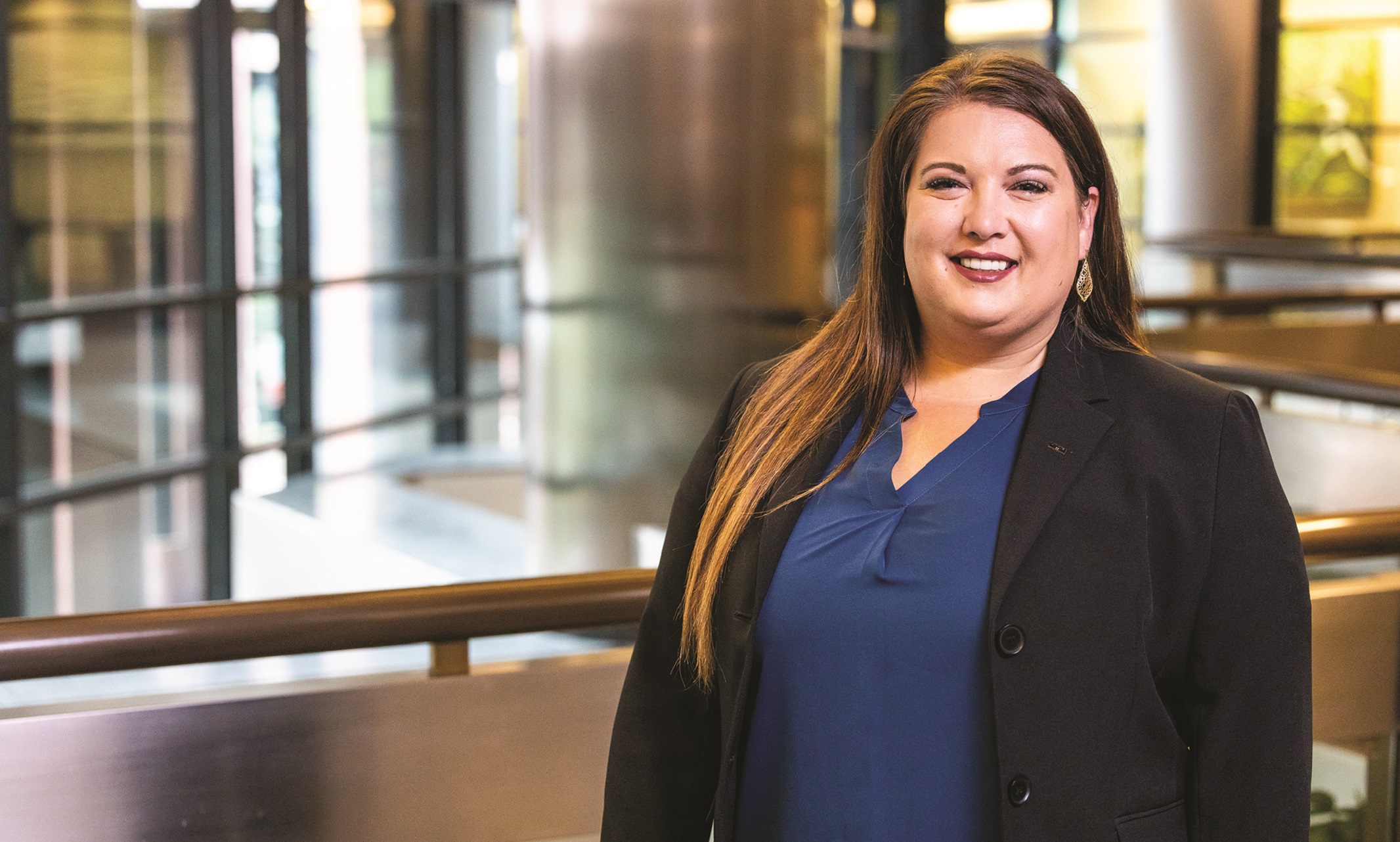
Alumna Jacquie Ward took her Bloch education all the way to the bank
Jacquie Ward, (MBA ’16), recently stepped into the role of director of private investments at UMB Family Wealth. She took this step relatively early in her career, but she felt prepared thanks in part to her education at the Henry W. Bloch School of Management and the student involvement opportunities that even a working student can join.
“I loved my time at UMKC, but I loved it that much more because I made a point to stretch and get involved,” Ward said. “That’s where I feel like my education became an actual game changer in my career. That’s where I met people that I still work with. I met some of my best friends. Some of the alumni that I met in those positions are the ones that I still call on and talk to on a regular basis. I see them at other industry events, and they now know me. That helps facilitate conversations.”
Though Ward now holds a master’s degree from UMKC, she began her career in finance immediately after completing her undergraduate degree in financial management, financial services and financial controllership at Kansas State University, following in her family’s footsteps. Her mother made a career in corporate finance during the 1980s, and Ward saw firsthand the struggles a working woman can face in a male-dominated field. However, Ward said she is optimistic about the current environment at UMB and in the field going forward.
“I see the world that I started in 10 years ago and the world I’m in now,” Ward said. “It’s definitely still a male-dominated space, but we do have women in really strong leadership positions as well. That’s something that, when I looked at my mom’s generation, she didn’t have, but I do. You have a chance to succeed when you have someone that knows exactly what it’s like in your situation and is in a position to be able to help guide you and the whole institution.”
One of the benefits of getting an MBA at UMKC, Ward found, was the real-world experience she could bring back to the office after each class.
“My UMKC education was top notch,” Ward said. “Within the classroom, we were doing things that were educational, but we were also doing things that I still tap into from a day-to-day basis for my job. We had a lot of professors that were great about aligning what we were doing with real life work. That prepared me for taking that next step in my career and expanding my network.”
Ward encourages anyone pursuing their MBA to get involved as well.
“You can go and show up to class, and you’re going to do just fine,” Ward said. “You’re going to get a great education, but you’re really not going to get everything that it can offer. Try to go that extra step.”
Jul 20, 2022

Special event also marks grand reopening of renovated Bloch Heritage Hall
A century after his birth in 1922, Henry Bloch continues to have a powerful impact on Kansas City’s entrepreneurial landscape and in shaping future generations of business leaders.
“Henry was a real presence at the Bloch School and remains a presence,” said Brian Klaas, Dean of the Henry W. Bloch School of Management. “I loved watching Henry with our students. He demonstrated such humility and kindness. He was so supportive and tried to give them a message that really would help them in life.”
This year, the Bloch School celebrates the 100th anniversary of Henry’s birth with yet another incredible milestone of his legacy, the grand reopening of Bloch Heritage Hall. The historic hall, located on UMKC’s Volker Campus, has been closed since early 2021 while undergoing a massive $17 million renovation. On July 30, the school will commemorate Henry’s 100th by unveiling their work and the new era of Bloch Heritage Hall.
“The grand reopening is a fitting way to honor Henry,” Associate Dean Sidne Ward said. “Like Henry himself, the redesign will be transformational. It will improve the student experience, enhance learning and student achievement, help students engage with the school and each other and launch their careers.”
Students, alumni, community partners, faculty and staff are all encouraged to join the celebration and tour the new facilities on Saturday, July 30, from 10 a.m.-12 p.m. The event is casual, family friendly, and as Henry would have wanted, there will be birthday cake, ice cream, food and activities for all ages.
The celebration will also feature special events throughout the Bloch campus to allow members of the Bloch School community to look back on many of Henry’s accomplishments and reflect on the ways his impact continues to be felt in the community.
Henry W. Bloch
“Celebrating the 100th anniversary of Henry’s birth gives us an opportunity to celebrate his special brand of entrepreneurship, which focused on achieving success and making the world a better place,” said Chancellor C. Mauli Agrawal.
“Henry’s generous gifts to UMKC and the Kansas City community at large have helped shape the landscape of the city and how business is done here,” Klaas said. “More than just financially, the way Henry chose to give back provides an example for others to follow. The lesson Henry offered was ‘work to be successful,’ but always work in a way that’s consistent with your values and in a way that makes a positive contribution to your community and to society.”
These values continue to inform the way the Bloch School prepares its students for success after graduation.
“Some of the things Henry demonstrated throughout his career were things like humility, modesty, integrity,” added Klaas. “He also demonstrated courage and a willingness to be bold. What we try to do throughout our programs is emphasize these kinds of virtues.”
For example, special scholarship programs such as Bloch Launchpad include elements of community service and community building, alongside conventional internship opportunities. Trevor Davis, a senior accounting major, said the program not only made college affordable, but also defined his entire student experience.
“It really took me out of the classroom and helped me know what’s to come after college,” Davis said.
Davis said he looked forward to meeting Henry — possibly running into him on one of his frequent campus visits — to personally thank him for his scholarship funded by the Bloch Family Foundation. Unfortunately, Davis never had the opportunity. Henry passed away in 2019 at age 96.
Still, Henry’s esteemed virtues live on in students like Davis as they transition into the business leaders of tomorrow.
“At a school surrounded by his legacy, you soak up some of what the professors speak about him,” Davis said. “The main thing I’ve learned is just to be genuine in your relationships with people, and that will carry you a long way in your career.”
Jul 20, 2022
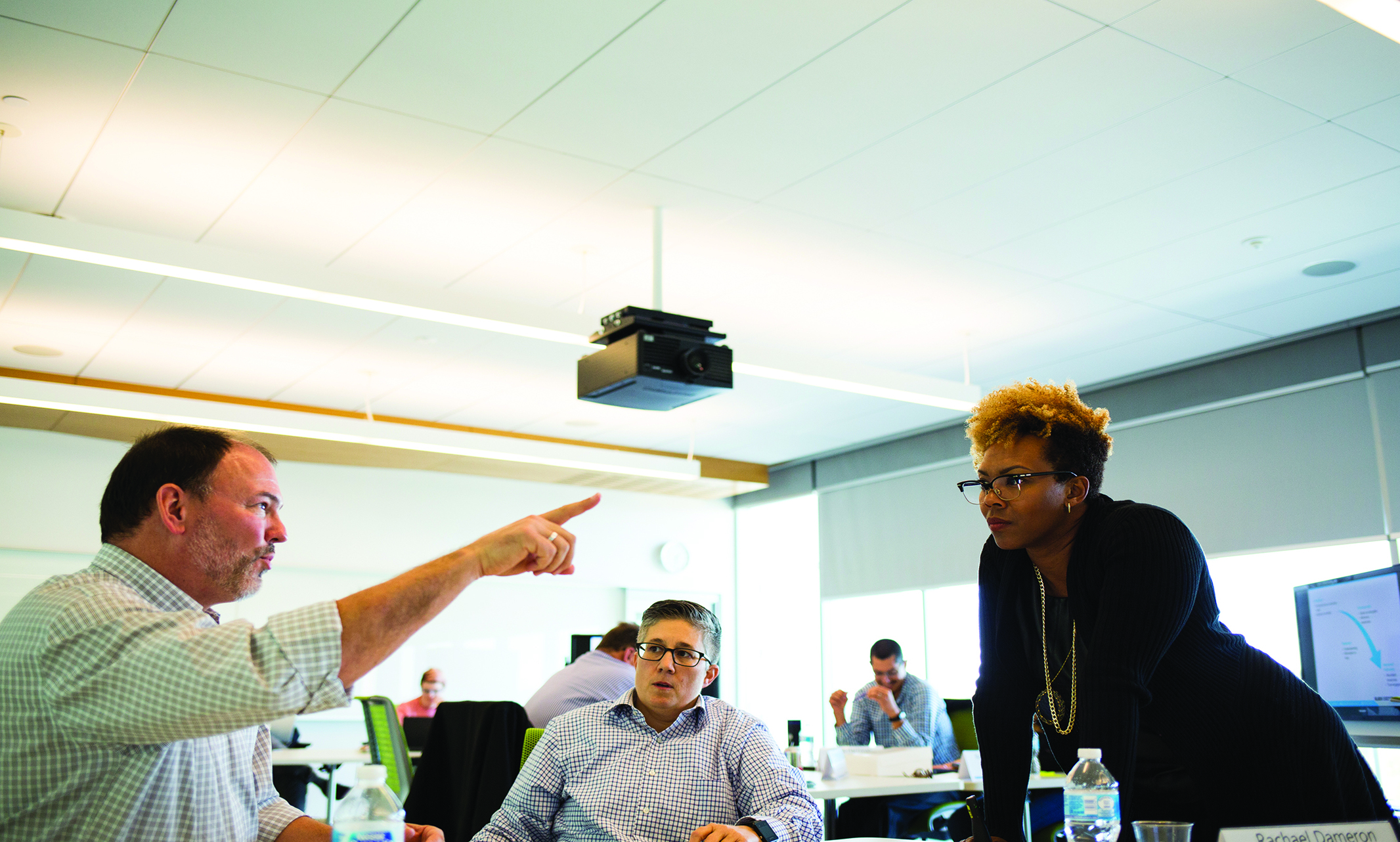
Flexibility puts students' needs first
For the third straight year, UMKC's Henry W. Bloch School of Management has topped the Kansas City Business Journal's ranking of enrollment in regional MBA programs.
The Bloch School had 429 students in Fall 2021, according to the list, with Rockhurst University's Helzberg School of Management (357 students) and Baker University's School of Professional and Graduate Studies (228 students) rounding out the top three.
A keen focus on meeting the needs of students and Kansas City-area employers helps the Bloch School outdraw its counterparts, said Dean Brian Klaas and Associate Dean Brian Anderson.
"We provide experiences that are very much focused on organizations in Kansas City," Klaas said. "And we are working to customize our program to really create stronger and stronger linkages with the industries that are here."
Those partnerships include major employers such as Burns & McDonnell, Cerner, Evergy and McCownGordon. Klass also noted "rich engagement" with startups through Bloch's Entrepreneurial Scholars program and work with entrepreneurs in underrepresented communities.
Flexible scheduling is a key way the Bloch School meets the needs of its MBA students, since many of them are pursuing their degrees while working. Students may switch between online and in-person classes, sometimes even week to week.
Significant investments in classroom technology facilitate this flexibility, including rooms specially designed to serve a hybrid audience. Screens in the front and back of the room integrate online participants with those attending in person.
Health and safety protocols necessitated by COVID-19 accelerated the move toward hybrid learning.
"Flexibility is something that has shifted from a desire to an expectation," Anderson said.
This fall, the school expects to create two Bloch Studio spaces that will give remote students "an even more immersive online experience," Anderson said. The rooms will have TV-studio-quality audio and lighting along with interactive whiteboards and multiple monitors.
"We are investing in Kansas City and being a talent development partner for the region," Anderson said. "I think creating programs, connections and opportunities for students to build their network in Kansas City has significant appeal to working professionals in the region."
Jul 20, 2022
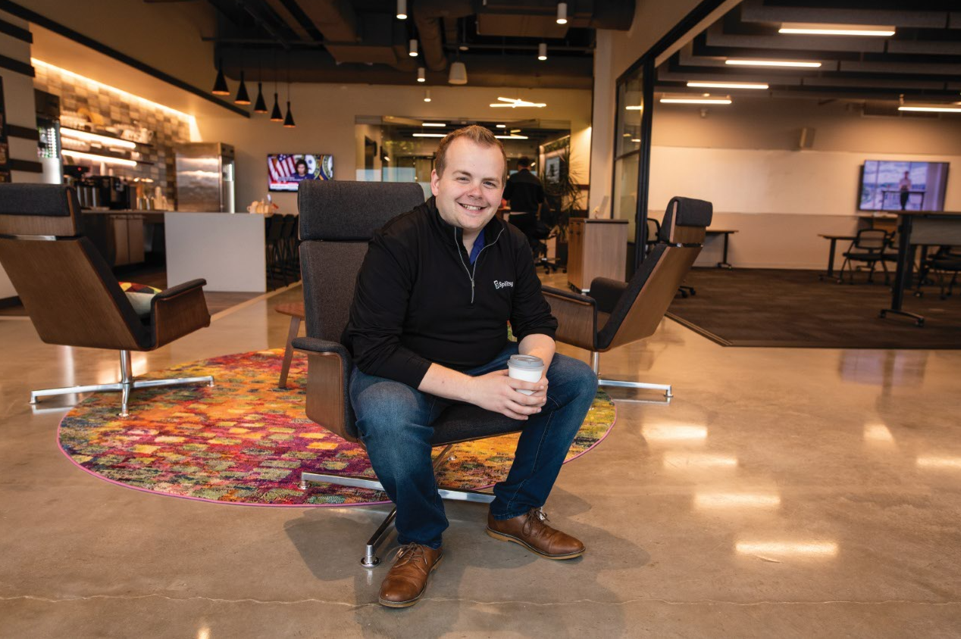
Brad Starnes hopes to make sharing bills easier, sparing friendships in the process
Student Entrepreneur of the Year Brad Starners's startup venture, Splitsy, began with a personal struggle.
Throughout college, Starnes recalls multiple occasions where sharing expenses with roommates and friends became problematic. Once on a summer trip, he covered dinner for 12 when the restaurant wouldn't split the bill. His friends paid him back, but it took weeks. After several years of trying multiple arrangements to share utility bills with roommates, his relationship with one of them became hopelessly strained.
"We actually spent two months where we weren't talking because of bills," recalls Starnes. "I almost lost a really good friend because of this problem."
He knew there had to be a better way. That's when he created Splitsy. Unlike existing payment apps, Splitsy allows roommates to be billed directly for their portion of the bills. It partners with 15,000 billers nationwide, including T-Mobile and Evergy. Each month, Splitsy collects each person's per-set portion and then pays the biller on the group's behalf.
In 2019, Starnes, a UMKC information and technology student at the time, enrolled in the Bloch E-Scholars program for credit. The Bloch School program supports entrepreneurs as they take their ideas from concepts to fully-fledged businesses.
Starnes graduated with his bachelor's degree in information technology in 2020. He had a job offer from health care company Centene Corp. in St. Louis, where he interned. However, he couldn't make peace with the idea of letting Splitsy sit idle.
"I was kind of getting irritated that I was not going to be doing what I wanted to do, which was Splitsy. At that point, I decided, 'I'm tired of this being an idea,'" said Starnes.
Starnes turned the offer down and enrolled in the Bloch MBA program. He focused his energy on growing Splitsy and finishing his MBA at an accelerated pace. By 2021, Splitsy had earned funding from Digital Sandbox KC and won the Regnier Venture Creation Challenge. Starnes was also honored as the 2021 Student Entrepreneur of the Year by the Bloch School.
While Starnes admits going to school full-time and building a startup at the same time can be challenging, it has its benefits.
"Every semester during my MBA, there were things I learned in my classes that I could directly apply to what we were doing with our team at Splitsy," Starnes said.
Of course, experience has been a teacher for Starnes, too. He has faced setbacks, including running out of cash and signing on with vendors at unmanageable terms. But now that he has overcome those barriers, Starnes is proud of what it has taught him.
"I'm just proud of all of the knowledge that I've gained so far and where we've gotten," Starnes said. "At this point, no matter if Splitsy works or not, I've gained the knowledge and expertise to prepare me for what's next."
Splitsy is actively growing its beta user base and raising funds for use for customer acquisition. Starnes plans to launch Splitsy on Google Play and the Apple Store in the coming months. He also hopes to add new features, like allowing users to split one-time costs.
As for the strained friendship that started it all, Starnes counts himself among the lucky ones.
"Thankfully, we're in a much better place now, actually much better than when we were roommates," he said. "Not everybody has the same opportunity to regain a friendship with a roommate that you almost lost."
After all, Starnes said, having close friends and family to share his successes with means the most.
"Not only was I being rewarded, so were family and friends who were supportive of me from the beginning," he said. "It was nice to be able to share that with the individuals who helped us for so long. Just to be able to say 'thank you.'"
Jul 20, 2022
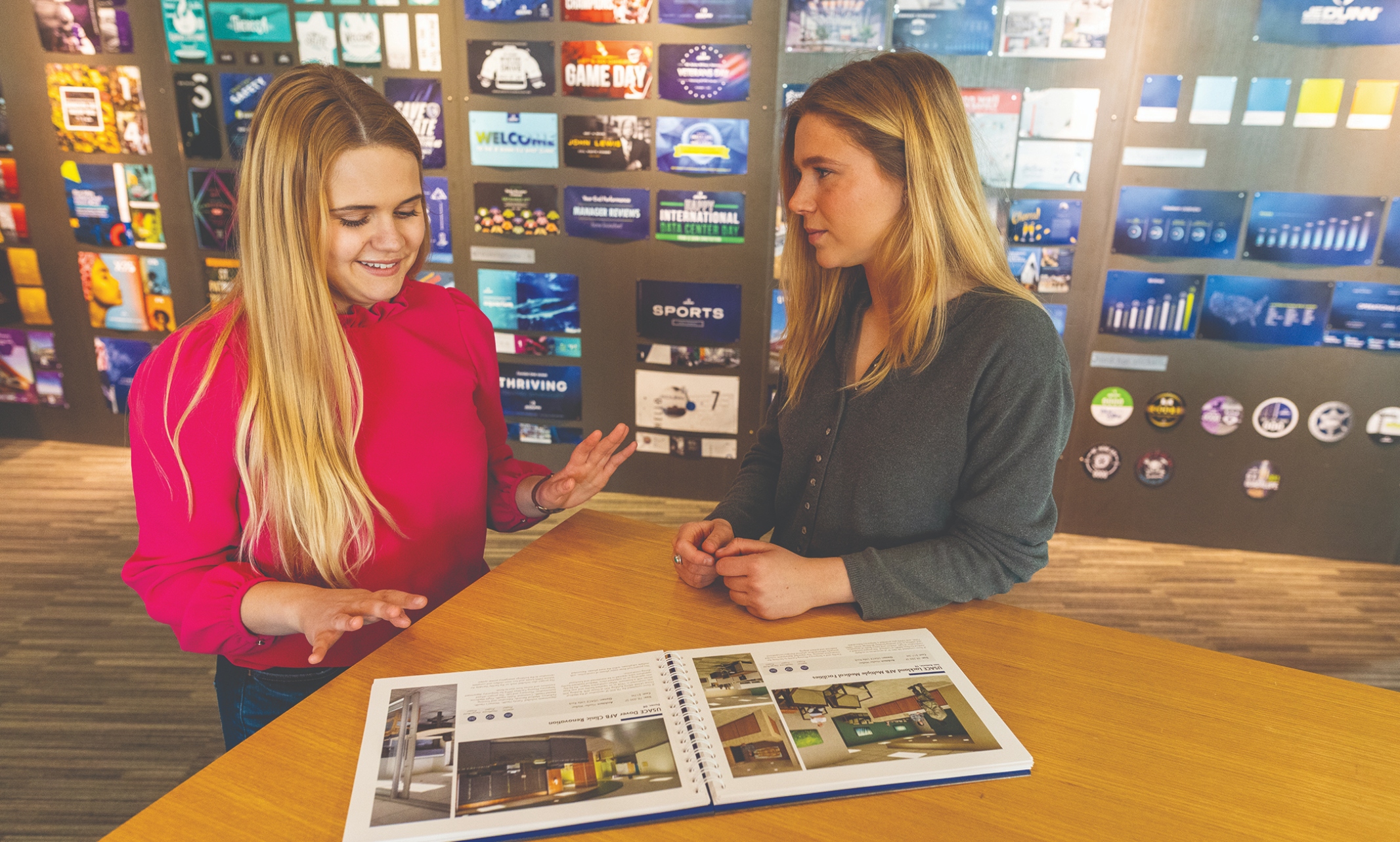
Program gives valuable insight into life after college
The Bloch School took its focus on mentoring opportunities to an exciting new level with the launch of a schoolwide mentoring program open to all students. This new initiative is designed to serve students from all walks of life, from first-generation college students to working professionals earning their MBA.
“Mentoring can be transformational with individuals across all industries and business functions, so it’s important that there are options for students interested in a variety of business areas,” said Ashley Nance, professional development manager for the Bloch School. “This program is also a fantastic way for alumni to give back to the university and pass along key lessons to future business leaders.”
The program launched as a pilot in Fall 2021, with 87 students and 68 mentors participating. The goals are to add 150 student matches each semester and create a pool of more than 500 mentors within the first year. The program uses a sophisticated algorithm through UMKC’s Roo Network alumni platform to match students and mentors, who then set up connections.
“Our mentors and mentees are encouraged to interact in whatever way it makes sense for them. A majority of pairs choose to communicate through phone, email, text or video chat, but some connect in person as well,” Nance said.
One of the initial matches paired student Elena Eckwall with mentor Sydney Manning, a marketing specialist at JE Dunn Construction.
“As a transfer student coming into UMKC, I wanted to get involved with a program that could help connect me to professionals in the Kansas City area,” Eckwall said. “Marketing is an area where the possibilities are endless, and I wanted to learn what it’s like navigating through this field right out of college.”
The algorithm matched Eckwall with a mentor who not only works in her field of study, but also shares other common interests and values.
“At our first meeting, it didn’t take long for me to feel comfortable with Sydney. I instantly felt that she was committed to developing the relationship,” Eckwall said. “She took the time to give thoughtful and meaningful answers to my questions. She also made it easy to bond and have fun in our meetings.”
When Manning first heard about the program, her immediate thought was “how much I wished I had this program when I was a student.”
“As a student, it was hard for me to see past college or what my life would look like in a few years. Everyone was so focused on what their dream job was or what their 10 year plan was, when I was still trying to figure out where I would be in six months,” Manning recalled. “Being able to offer my unique perspective as a young professional was very interesting to me.”
Eckwall derived significant value from the mentoring program.
“Learning about how Sydney navigated through college and onto work at JE Dunn helped me reflect on steps I need to take moving toward my future,” she said. “She taught me the value of networking and of taking opportunities when they arise.”
Mentor-mentee pairs are formally matched for four months, but manystudents and mentors have continued to meet beyond that period. The Bloch Mentoring Program is open to all, from early-career professionals to seasoned leaders.
Those interested can email Ashley Nance at amnance@umkc.edu for more information or sign up through the Roo Network alumni platform.
Jul 20, 2022
Alumni support Bloch scholarships to further opportunity for student success
Henry Bloch demonstrated commitment to building a stronger Kansas City through his support of education and future generations of entrepreneurs. Following the example of the Bloch School’s namesake, several successful Bloch alumni are now paying it forward, providing opportunities to students who follow in their footsteps.
Cory Smith (M.P.A. ’77) had worked at Black & Veatch in Kansas City for four years when he decided to pursue his master’s in public administration.
“The experience was a reawakening,” Smith says. “My organizational behavior class with Dick Heimovics, Theory of Communication with Tom Miller and so many other great instructors opened my eyes to a new world.”
Through these classes, Smith became more interested in national and local politics, economics and government, and ultimately the social issues and problems related to them.
“Ultimately, this led me to a career in city management,” said Smith.
Smith’s successful career started with an internship through the Kansas City Manager’s office. His wife, Marilyn (M.A. ’77), was a teacher and counselor in public schools, and together they became active in the community through the Mid-America Regional Council, Rotary Club and many local charities. The ability to give back and engage in the community has been both enlightening and inspiring for the couple. Their commitment to community involvement led to the establishment of a scholarship fund.
“We believe education should be for everyone who wants to learn and become future entrepreneurs, innovators and problem solvers, regardless of their financial ability,” Smith says. “We both came from working-class families who could not afford to pay for a college education for their children. Our scholarship fund is relatively small, but our hope is that over time it might help those students in need of financial support fulfill their dreams for lifelong careers — something we have been so fortunate to have done.”
Nate Hogan (MBA ’21) established a scholarship for students at the Bloch School following his election to the Kansas City Public School Board. Based on his personal experiences, the scholarship requirements do not include a minimum grade point average to apply.
“I want to help make schools that are designed to support kids who are like I was. I had no social or emotional support as a kid, and I started skipping school. No one would have given Nate Hogan a scholarship. I grew up in the Kansas City Public School district, and I know what it’s like not to be academically engaged. What I care the most about is that the student wants to go to school.”
These scholarships are instrumental in attracting students and helping them stay enrolled. Cassandra Queral (B.S. accounting ’22) chose the Bloch School because of its outstanding reputation and the opportunity to be surrounded with like-minded students. Her scholarship was essential to attending.
“I have supported myself financially since I was 18,” Queral says. “Receiving a scholarship provided extra incentive to dedicate myself completely to my studies; it boosted me beyond my own motivation. It allowed me to believe that someone outside of myself and my family saw capabilities in me. It allowed me to believe I had the potential to shoot for the stars with this experience.”
Cody Cook (B.S. accounting ’21) currently a financial analyst for T-Mobile, had a similar experience.
“Getting a scholarship allowed me to reduce my working hours and focus more on school and getting an education,” Cook says. “Growing up, my family didn’t have a lot of money. College was never an option for me. Without this funding, I wouldn’t have been able to get my degree.”
For more information on accelerating student success at the Henry W. Bloch School of Management, contact Matt McDonough, senior director of development, at 816-235-6623 or mmcdonough@umkcfoundation.org.
Jul 20, 2022
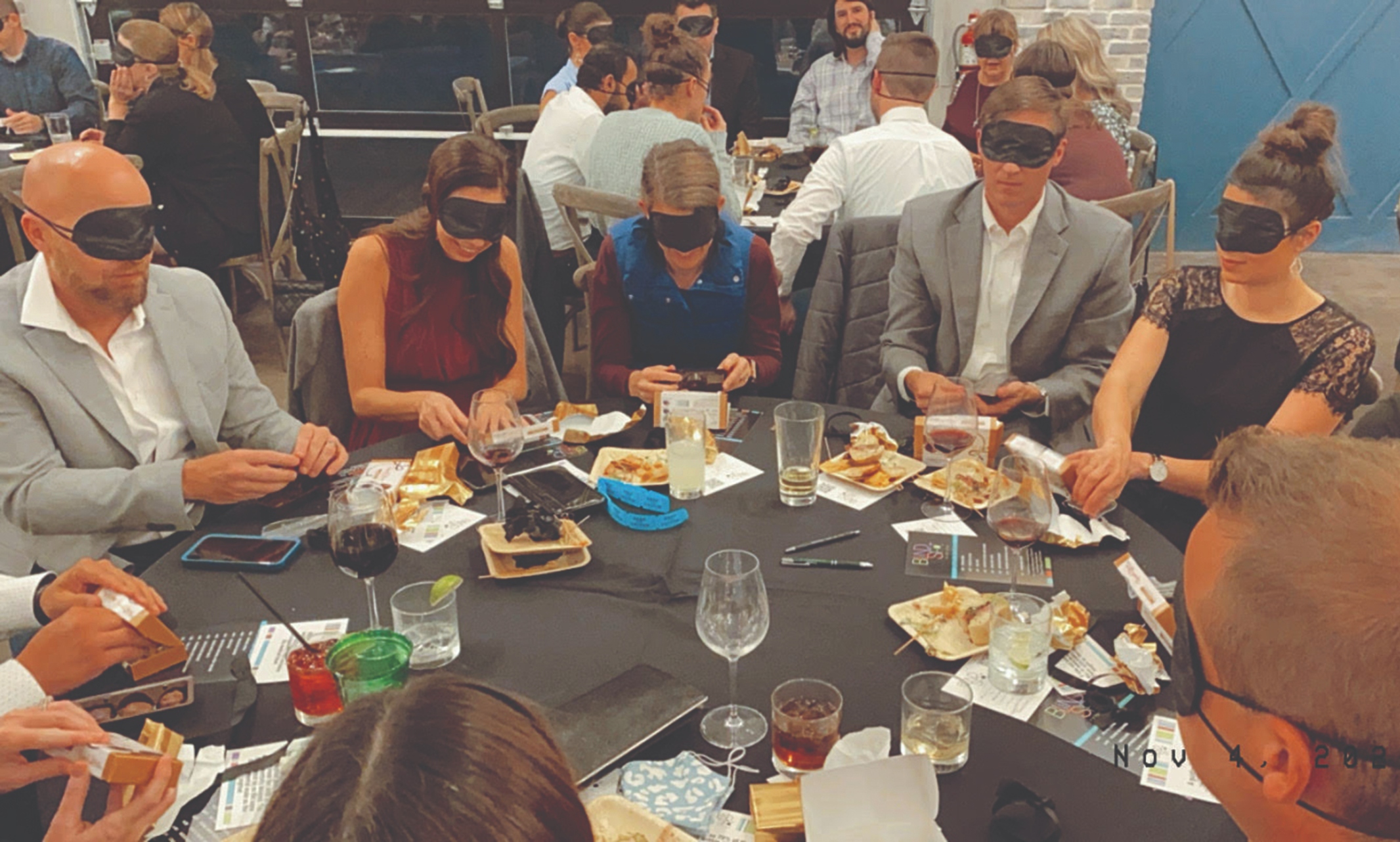
Chris and Nicole Carr are hoping to raise awareness and support for the blind community
It was a long 18 months for Chris and Nicole Carr, as they waited to learn exactly how much vision their third child, Mac, would have.
Diagnosed with optic nerve hypoplasia — a disorder that can range from partial to complete blindness — Mac was born without the ability to see, something his parents discovered through his unusual eye movements and the way Mac reacted when someone would pick him up as a newborn.
Nicole Carr (B.S.N. ’06) had three degrees in nursing, but she was unfamiliar with the diagnosis. Chris Carr (B.L.A. ’08, MBA ’17) shared in her concern as they waited to learn the severity of Mac’s ailment. In this case, Mac was lacking almost all of the nerve cells required for sight.
Chris had never met a blind person; Nicole had only once, at a nursing home when she was 16. Regardless, they met the unexpected challenge head-on. In the process, they not only helped their son, but found ways to aid the blind community through Blind Spot, the nonprofit they created together. After Mac’s diagnosis, Chris and Nicole got involved with Kansas City’s Children’s Center for the Visually Impaired. Mac began working with specialists. In the meantime, Chris and Nicole searched for community resources that could help them parent Mac.
“That’s when we kind of realized there isn’t a whole lot,” Chris said. “You’re visually impaired; you go one of two routes. You either take the school for the blind route, or you go the route of full, regular-world integration. That’s the way we went.”
Chris and Nicole wanted to do something for CCVI and asked about a gala-type fundraiser they could help with. Upon learning there wasn’t one, they decided to start their own. Chris leaned on his network— including his connections at the Bloch School — and the Carrs secured a deal from The Monarch Bar and Lounge on the Plaza to host an event. Chris and Nicole raised more than $40,000 for CCVI. They held the event again the next year and raised nearly $150,000.
Then came the idea for Blind Spot — which Chris credits Nicole as the brains behind. The nonprofit aims to help the visually impaired reach their highest potential and to teach sighted individuals how to be good allies to the blind.
Chris remains active in the UMKC community, serving on the Bloch Alumni Board and mentoring current students. His networking and business knowledge also help him manage the organization, securing federal identification and handling the financial aspects.
“He gives a very compelling speech, too,” Nicole added. “Blind Spot would not exist [without] the work he has put in. ... I have these crazy ideas. He’s kind of amazing how he’ll never sell me short, and he’ll never shut me down.” The Carrs held a launch event for Blind Spot on Nov. 4, 2021. They kept the event simple, aiming to build empathy with sighted members of the community by showing them what it’s like to not be able to see.
“At the launch event, we provided an opportunity for those in attendance to become a little bit vulnerable through an immersion experience,” Chris said. “The mission of Blind Spot and specifically the launch event was to enlighten the Kansas City community to how life for someone who is blind is different. Since blindness as an exclusive diagnosis is rare, there isn’t a lot of awareness with the general population on the abilities of the blind or how to become a good friend to the blind.”
Hands-on learning experiences continue to be a focus of Blind Spot.
At another recent event, attendees sat in a restaurant and experienced a meal while blindfolded. One of the challenges Nicole recalled was simply having difficulty hearing the person in front of her.
“It’s pretty amazing how your vision can help localize your hearing,” Nicole said. “I never knew that, and it really helped me understand why Mac struggles so much when he goes to birthday parties.”
Looking Ahead
Mac turned 5 in March and starts kindergarten in the fall. The Carrs’ plan has always been to help Mac be as independent as possible. Chris and Nicole have even had some support from Mac’s sisters, Nora and Aubrey, in helping him adapt to everyday life.
In fact, Nicole started to believe things would be OK while watching Nora and Aubrey guide Mac through daily activities.
“It was so simple and easy when they were articulating exactly what Mac needed to do in just the simplest way,” Nicole said. “It was so natural to them.”
The Carrs are also thinking about the future of Blind Spot. The nonprofit has partnered with the RoKC climbing gym and is planning an event with AMC Theatres where participants will experience a movie through a headset, among other events to come. A special moment, however, continues to be the first dinner, after all the guests removed their blindfolds and looked around.
“It sounds cliché,” Chris said, “but the eye-opening experience that it brings is just astounding when you do something like that.”
Jul 20, 2022
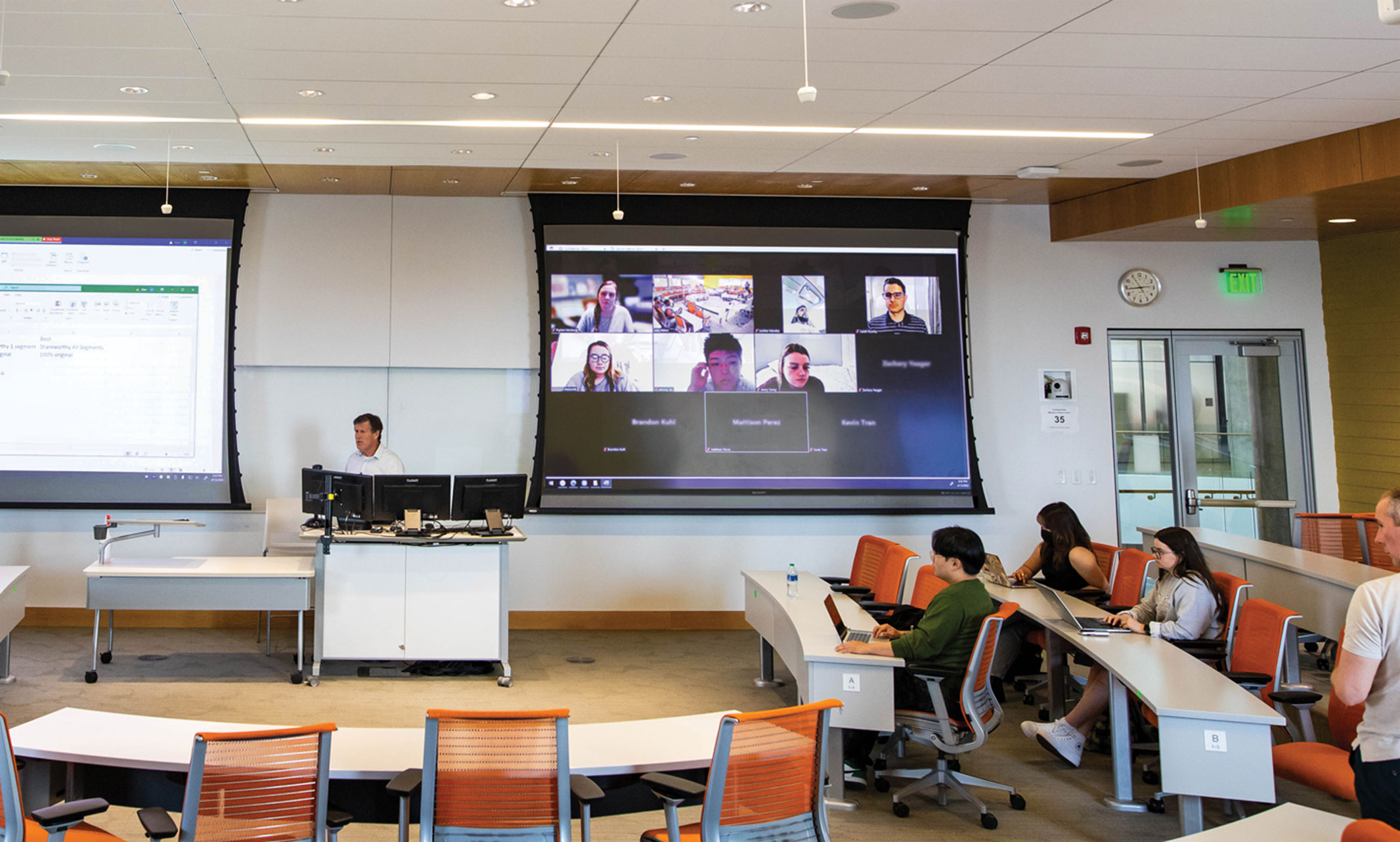
With RooFlex classrooms, Bloch is adapting to meet students’ evolving needs.
On Tuesday afternoons, when Alan Weber walks into Bloch Executive Hall to teach a 2:30 p.m. marketing class, he’s never sure where his students will be. They might be sitting in the classroom in front of him; perhaps they’ll be on a screen as they dial in through Zoom; most likely, he’ll have a mix of both.
Weber, an assistant teaching professor in the Bloch School, gives his undergraduate and graduate students a choice for each class: come in person or come online.
“It doesn’t matter, really,” Weber said. “I can see their face on the screen, and we can go back and forth with them and the students who come in person.”
This hybrid model — offering classes simultaneously online and in-person—is gaining traction at a number of prominent business schools, including at Bloch. The hybrid model allows the school to better serve students who need additional flexibility to complete their degree while managing other responsibilities at work and at home.
The school’s Bloch Executive Hall contains two “RooFlex” classrooms, equipped with more than $100,000 worth of technology — multiple microphones, cameras and monitors — designed to fully integrate online students with their in-person peers. These classrooms were designed and launched early during the pandemic and offered many benefits for students and faculty over the last few years. Further, the introduction of these classrooms provided an opportunity for the school to learn how best to deploy and use this new technology and this new classroom design.
As the Bloch School was experimenting with these new classrooms in Bloch Executive Hall, it also was working to renovate and redesign Bloch Heritage Hall. Heritage Hall was closed in 2020 for an extensive renovation project, one that was very much informed by what was being learned with the new hybrid technology being used in Bloch Executive Hall. When Bloch Heritage Hall reopens in July 2022, it also will feature this same type of hybrid classroom technology in a number of key locations within the building.
So when students return to a redesigned Bloch Heritage Hall in the fall, they will have a very different experience. In part, that new experience will be the result of a renovation that will feature a hub for student and career services, a new student commons, redesigned outdoor space for gathering and engagement and enhanced space for individual and group study. And in part, that new experience will be the result of new classroom designs and new hybrid instructional technology designed to encourage student success and engagement.
“The way that people work in general, and the different obligations on their time, meant that flexibility was something students were looking for,” Ward said. “That might mean time — do classwork on your own time. Or it could mean place — you don’t have to be on campus all the time to attend class.”
Since the pandemic, that flexibility is practically a requirement for students.
A 2019 Bloch School strategic plan anticipated offering 50 hybrid or online courses in 2022, 75 in 2024 and 150 by 2029. When the pandemic sent everyone into lockdown, the demand for online courses skyrocketed. This year, the school offers 230 sections online or as hybrid classes, so students can choose if they want to come to campus or log in from home or the office.
Executive MBA student Tracy Allen said returning to college wouldn’t have been possible without the flexibility the Bloch School offered. Allen, the founder and CEO of Brewed Behavior, a coffee consultancy based in Kansas City, had a busy career and two teenagers. Pursuing his MBA without the ability to dial in some of the time, Allen said, “would have been tough.”
“I did (class) last weekend on a cruise ship off the coast of Mexico. I’ve done it in three or four Latin American countries,” Allen said. “With my kids here, it’s nice to be home on Saturdays and still do class.”
At the same time, he has felt it was important to go to campus and interact with his fellow students sometimes, too. Having both options, he said, was key to making the program work for him.
Allen is not alone, especially among the Bloch School’s executive and professional MBA students who pursue their graduate degrees while managing a career and, in many cases, family life.
Brian Anderson, executive associate dean and associate professor of entrepreneurship, said prior to the pandemic, graduate students preferred online to on-campus instruction about 60% to 40%. Today, he said, it’s more like 85% to 15%.
“I think it is safe to say that students’ desire for flexibility will be a key consideration for schools over the next decade,” Anderson said.
Questions about what that flexibility will look like long-term are still being answered. In the early days of the pandemic, the Bloch School asked students if they wanted to return to campus. But that turned out to be the wrong question, Anderson said.
“The right question was not, ‘Do you want to come?’ The right question was, ‘How do you want to engage with your courses?’ ”
And the answer, Anderson said, was, “It depends.”
“Students want flexibility,” he said. “They want to be able to choose. Sometimes that choice is, ‘This semester, I have a really neat internship, and it’s going to take a lot of time and fixed hours, so I’d like to be online this semester. But next semester, I’d like to be on campus.’ ”
On the other hand, students might feel more comfortable meeting in person when certain courses or subjects are more challenging. Or they might want a chance to network and meet their peers.
Bloch School officials acknowledge that meeting this need for flexibility is a juggling act. It’s not as simple as flipping on some cameras and microphones. The evolution to online or hybrid course formats calls for not only changes in physical classrooms and faculty training, but also new approaches to how courses are structured and taught.
The Bloch School is working to tackle the changing landscape on a course-by-course basis. While more courses now have a remote option, Anderson said those options are dependent on the course content and available classrooms.
Not every course has the complete flexibility Weber’s marketing class offers, where students can choose for themselves how they want to engage each class period. Professors might ask students to choose if they’d like to be in person or remote and require that they stick to that option for the entire semester. Others may give students a limited number of times each semester they can dial in. Still other courses — like those requiring a lot of small-group work — may not have a remote option at all.
“It’s really created a far more challenging planning puzzle, but also one that really allows us to think about what the best way is to deliver this course for our students and what their expectations are,” Anderson said. “It’s a student-centric approach.”
One consideration is how much physical space is necessary. An even bigger one, however, is what that space should look like. While some courses benefit from many small breakout areas where students can gather to do group work, others work better as one central room.
Ward said the renovated Heritage Hall is designed to meet these many different needs. At least two RooFlex classrooms will be up and running when the building reopens, and other classrooms already have the wiring and infrastructure ready to add remote technology when the time is right. Ward said the expense — more than $100,000 per classroom — and the quickly evolving technology available for remote learning, mean those investments will be made conservatively.
“We’re constantly looking at newer technology to do this — just to upgrade the way that it works, making it easier for the students,” Ward said. “When you build an old-fashioned classroom — walls, windows, doors, desks — that works for a very long time. But outfitting one of these rooms doesn’t mean you’re not going to have to spend more (on upgrades) in couple of years.”
Bloch School officials point out remote learning technology is also bringing new changes and improvements in how instructors engage their students.
For example, a professor teaching in a RooFlex classroom could bring together subject matter experts from all over the country to speak to their students. Digital connections also allow for easy collaboration among students working together on problems or case studies. In his case, Weber said, the technology has made him completely reimagine how he taught his marketing classes.
Before adopting a hybrid model, Weber said he spent 90% of class time delivering a lecture — one he delivered to each section he taught. Now he records the lecture, asks students to watch it as homework, and uses class time to more directly engage with students.
“Before, I lectured twice a week and didn’t get much back and forth,” Weber said. “Now, class is nothing but engagement. It’s much more valuable to have face-to-face and one-on-one discussions.”
Importantly, officials say, the investments being made now to allow distance learning also give students a valuable lesson in the kinds of remote communication methods they will inevitably encounter in the business world.
“We’re preparing students to be successful in what is a very rapidly changing technology business environment,” Anderson said. “It’s incumbent upon us to make those investments and be innovative with our courses and how we use technology to be sure we’re delivering the value we need to.”
Jul 20, 2022
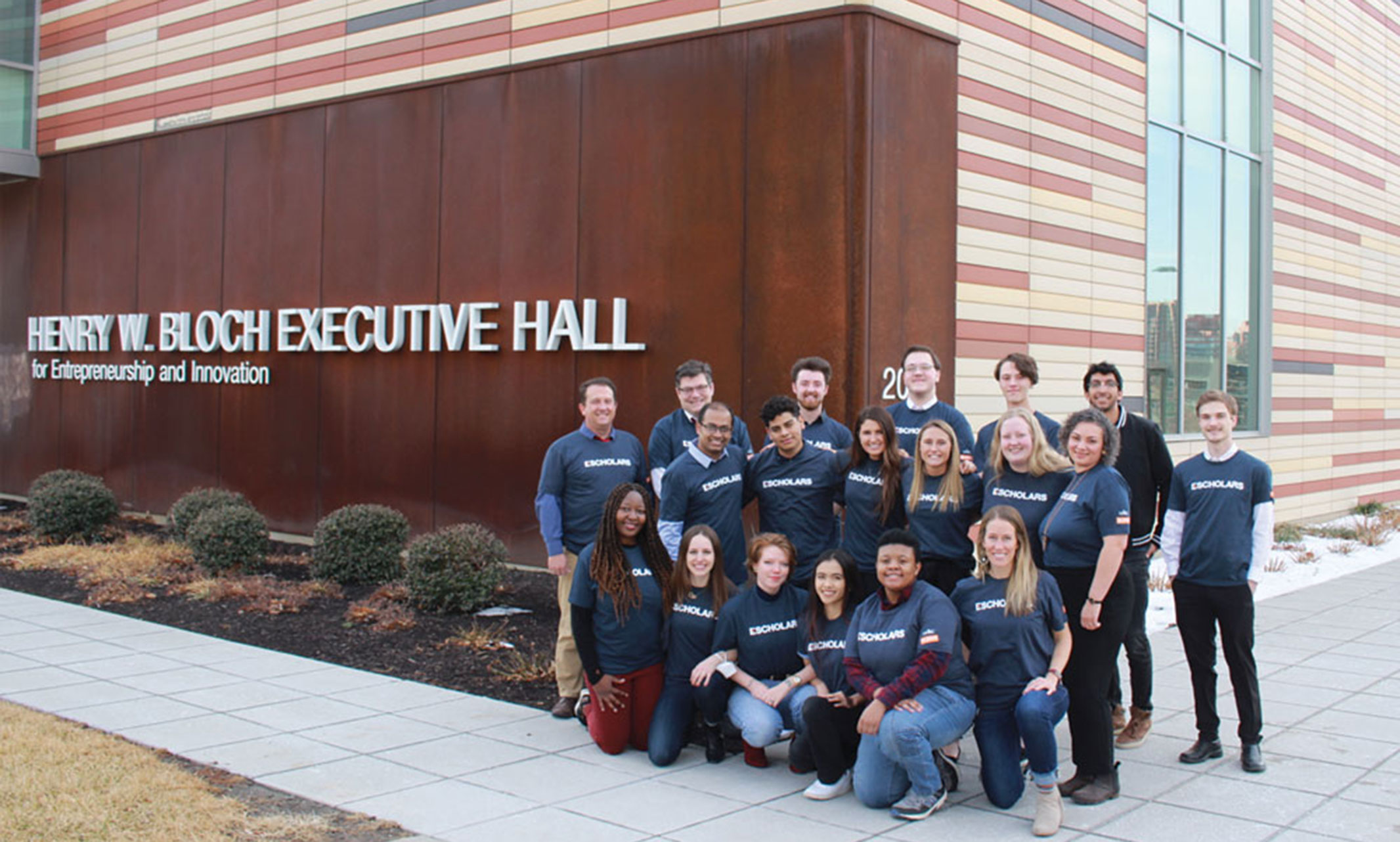
Program takes early-stage ventures from idea to business plan
The Bloch School’s Entrepreneurship Scholars, or E-Scholars, program has crossed a milestone, now helping more than 300 startup ventures find their footing in the business world.
“The research on how to help startups develop themselves suggests that startups should be treated like scientific experiments,” says Alex Matlack, director of the E-Scholars program. “We don’t tell them to go on their gut. We treat the company like an experiment, which allows them to be open about being wrong about their idea in some ways.”
The scientific approach was well-suited for A.J. Mellot, Ph.D., and his business partner Heather Decker, who went through the program in 2019.
“Heather and I are both scientists by trade, and the E-Scholars program really helped us get aligned with the business side of the things. When we started talking to partners and investors, we had the vocabulary to do so,” Mellot says. “Had we not gone through E-Scholars, I don’t think we could have done that.”
E-Scholars focuses on early-stage business ventures. Most participants begin the program in the idea stage, seeking to build their dreams into a business plan. In some cases, however, they have already launched their companies and are looking to create a plan for systemic growth.
The program supports ventures from all industries and technology types. Since its launch in 2011, E-Scholars has supported businesses developing mobile apps, enterprise software and medical devices, consulting businesses, retail, restaurants, fashion, nonprofits and education.
Participants spend the first months of the program testing their business hypothesis through customer interviews, product testing and prototyping. Following that, participants take part in “mentorship madness.” Matlack says to think of it like speed-dating for business relationships.
“We have them meet with 10 mentors and basically have the same conversation every 15 minutes. By the end of the day, you can already see their confidence growing. That’s when the fun really starts,” says Matlack.
With the help of the program, Mellot and Decker expanded and fleshed out their bioscience company, Ronawk, which has developed a technology to allow for rapid cell growth to be used for tissue and organ transfers. The company’s goal is to expand a patient’s healthy cells to engineer organoids, or grafts, that can be used in lifesaving surgeries.
“This program allowed us the opportunity to meet with so many other local businesses that were just starting, and we got to know a lot of peers and were able to support them from the beginning,” Mellot says. “Everyone in the class was supporting each other, and we have so many dear friends that we continue to champion.”
Since graduating from the program, Mellot says Ronawk has grown from Decker and himself to seven employees, with a likelihood of further expansion.
“We’ve grown our revenue every year. We’ve really started to see a lot of attention,” Mellot said. “We are engaged with over 70 companies that are either trying our products or piloting them.”
Jul 20, 2022
Local startup company hires multiple grads from UMKC’s Enactus program
Andrea Savage (B.B.A. ’19), Chad Feather (B.B.A. ’17), Brad New (B.A. ’13) and senior Riddhi Sharma all became involved in Enactus during their time at UMKC, and it led them to another common experience. They all now work for Daupler, a Kansas City-based startup company that uses intuitive technology to streamline internal and external communication for public utilities.
Working in a startup means frequently drawing upon knowledge about a wide range of business disciplines and, at the same time, leveraging entrepreneurial skills. The “Bloch team” now at Daupler all agree that Enactus helped them prepare for the challenges and opportunities offered at a new venture.
“The ability to identify a need, dissect a problem and figure out the resources and people you need to get the job done is something that Enactus really thrives at,” said Feather, currently director of operations at Daupler.
“One of the biggest things I learned at Enactus was how important it is to take initiative,” said Savage, a project manager. “You never know what you’ll need to do at a startup, so you might as well be a jack-of-all-trades.”
“I’ve worked with people from different backgrounds and cultures,” said Sharma, a former Daupler marketing and sales intern. “I’ve worked with people and on projects I never would have if it weren’t for Enactus.”
Ben Williams, faculty advisor for Enactus, said the organization encourages students to engage with the full entrepreneurial process, from inception to execution.
“It gives students a tremendous opportunity to make a real, sustainable impact on the world while building skills across many disciplines,” Williams said.
Brad New, a senior client success specialist at Daupler, agrees Enactus instills valuable, transferable skills in its members.
“Enactus helps prepare you to problem solve with limited resources,” said New. “In a startup environment, you might have to ‘fail fast’ to determine if an idea works or not, so you can focus on what will help reach your goals.”
Savage was Daupler’s fifth hire. She learned of the company after receiving a message from CEO John Bertrand on LinkedIn.
“I thought it was spam,” said Savage. “I didn’t reply at all the first time he messaged me, but after the second time I realized it probably wasn’t spam and decided to talk with him.”
Savage was considering the job when she heard from Feather, her former Enactus teammate. He encouraged her to take the job.
“I had done some research on Daupler, so I knew they were a great organization,” said Feather. “I didn’t know at the time that I’d end up joining the company nine months later.”
“I’m still close friends with a lot of my friends from Enactus, and occasionally we work on projects together,” Feather added. “It’s a great network beyond college.”
Jul 20, 2022
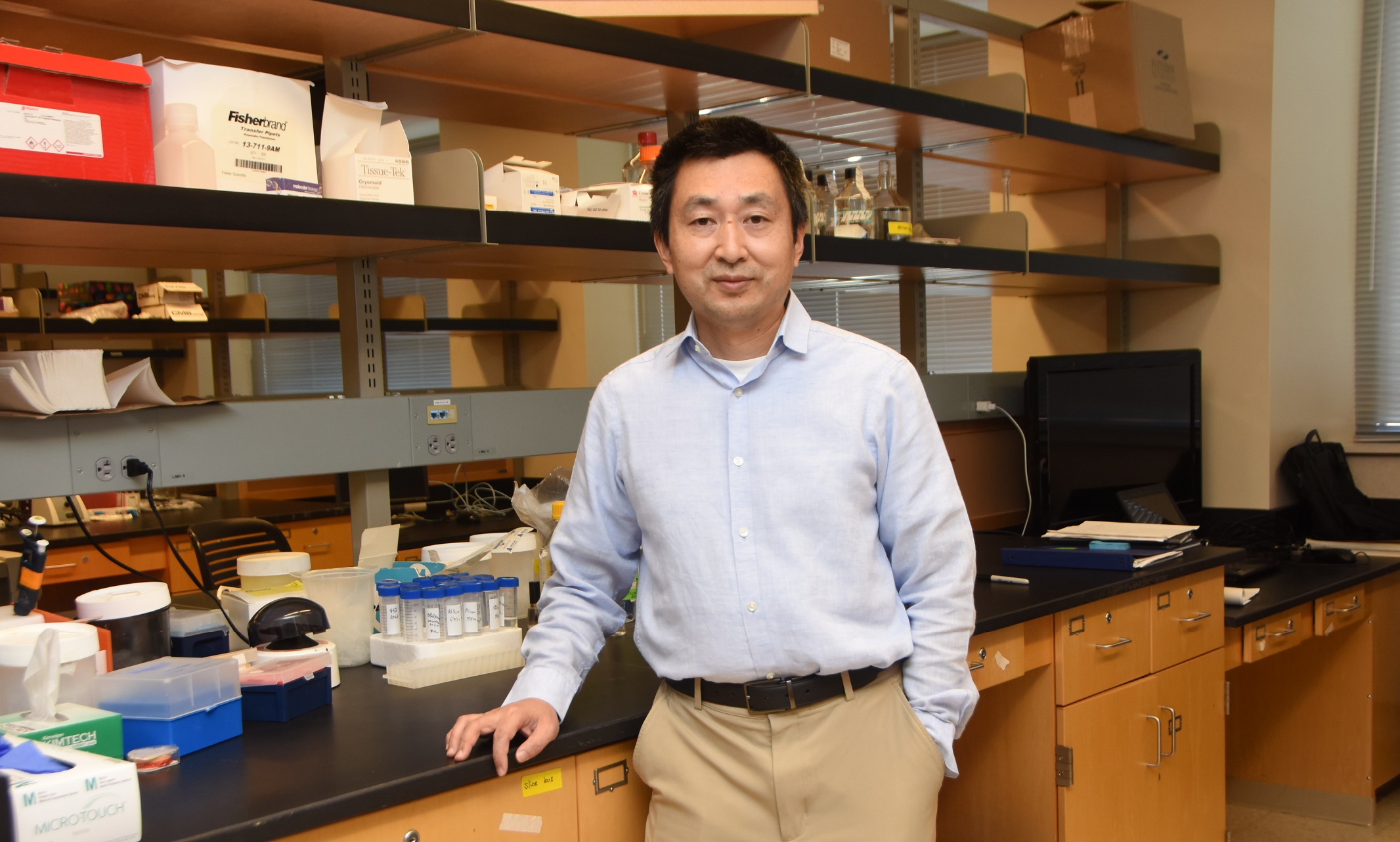
The grant funds research that could help develop better treatment for stroke recovery
Xiangming Zha, Ph.D., School of Pharmacy, received a five-year grant from the National Institutes of Health to study how part of the brain is affected during a stroke.
Zha will study how the GPR4 protein affects the blood-brain barrier during a stroke. The blood-brain barrier is a structure that regulates movement of nutrients and signals between the bloodstream and brain. Understanding how to protect this barrier may help us develop better therapeutic treatments for people recovering from strokes.
The grant, which is funded through the National Institute of Neurological Disorders and Stroke, includes $387,295 for the first year and a total of $1.94 million over five years.
“This NIH grant ensures support for this lab and our research for the next five years,” said Zha. “I am thankful for this team of collaborators and students; the research they are doing is important to help better understand the brain and improve outcomes in stroke patients.”
Zha has been researching the brain for years and has several projects in process at UMKC. School of Pharmacy faculty William Guthiel, Ph.D., and School of Medicine faculty Xiangping Chu, Ph.D., are collaborating on this research and will continue to do so, along with postdoctoral fellow and graduate students.
The National Institutes of Health, a federal medical research agency, is the largest public funder of biomedical research in the world. The organization invests more than $32 billion annually to reduce illness and disability and improve quality of life.
Jul 20, 2022
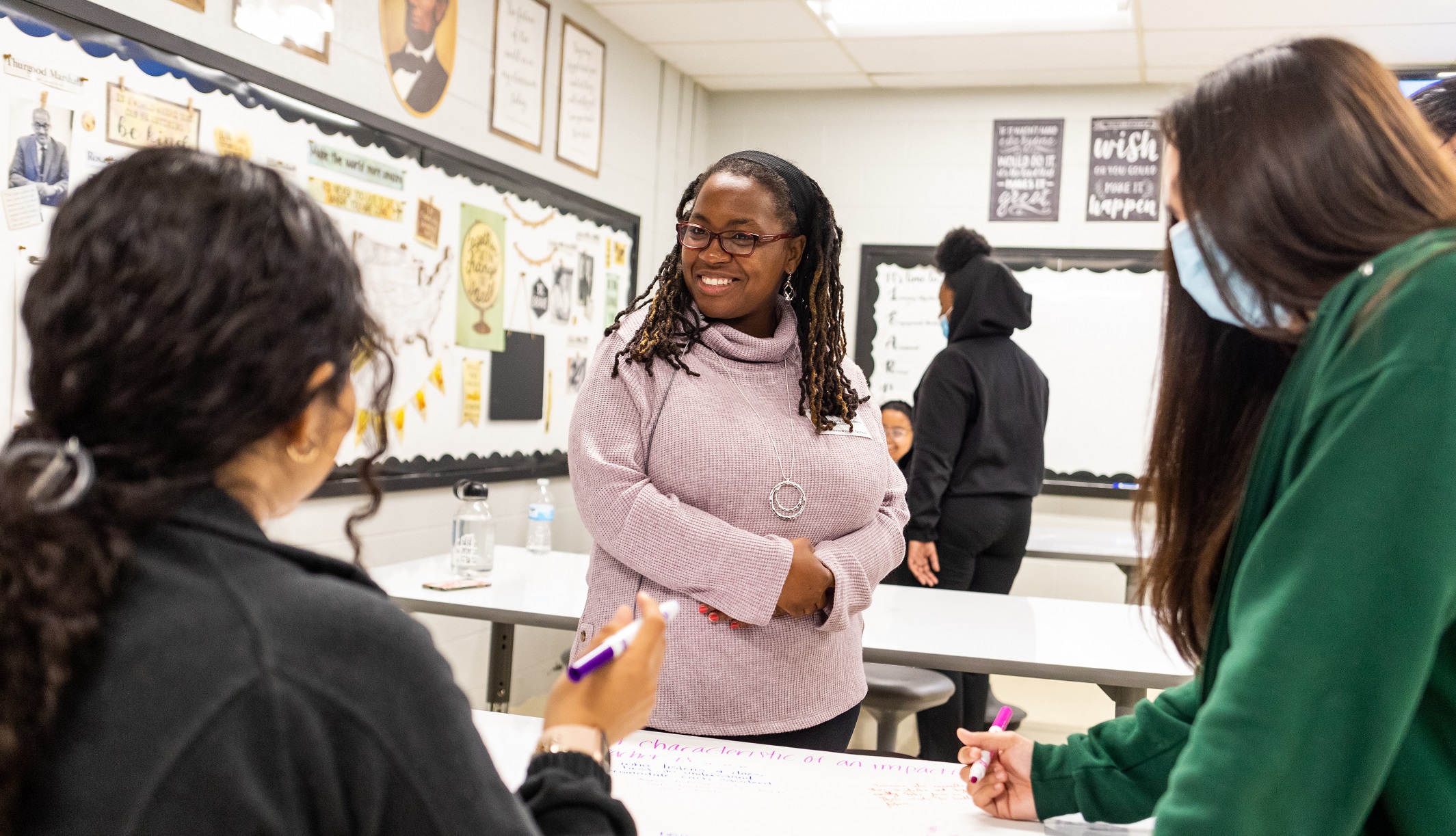
SchoolSmartKC funding accelerates student recruitment and program development
Funding from SchoolSmartKC supports the UMKC School of Education, Social Work and Psychological Sciences in growing programs to further meet the critical need for educators, particularly in the urban core.
SchoolSmartKC is a significant partner, both financially and philosophically, for the UMKC School of Education, Social Work and Psychological Sciences (SESWPS) and the Institute for Urban Education (IUE.) In the last year SchoolSmartKC (SSKC) has granted funds for the IUE’s Grow Your Own program as well as Project Recruit, Support, Retain, which bolsters student support and recruitment for the new 4 + 1 Master of Arts in Teaching (MAT) program. SSKC also provided support for Spring 2022 graduates who will teach in the Kansas City Public School System.
The partnership between IUE and SSKC is a natural one. Both organizations are working to optimize teacher and student success and eliminate the achievement gap for students in Kansas City, in addition to rethinking long-held tropes around teaching.
“I think everyone needs to keep in mind that teaching is very complex,” says Angelique Nedved, chief program officer for SSKC. “All of us come to learning with different backgrounds, different experiences and a different set of resources. However, when we have school as a structure, we tend to forget that, and we cluster people by their birthday, or maybe their interests.”
Nedved says it's imperative to talk about learners having individual needs. One reason SSKC partners with UMKC is because the SESPWS is actively tailoring curriculum to serve the individual student and the community. In addition, both organizations have goals to provide support that bolsters teacher pipelines, so that high school students have the opportunity to see what effective teaching looks like and demonstrate that being a teacher is impactful and fulfilling.
“We focus on entities like IUE and UMKC because they have evidence of not only attracting, but also recruiting students of color who are interesting in teaching, and then providing the supports students need to succeed in the program and stay within their community to give back through education,” Nedved says.
“IUE is fortunate to work with a group of funders who are committed to long-term support of the teaching profession, from recruitment to preparation and into teachers’ careers." - Jennifer Waddell, Ph.D.
Rebecca Williams, director of talent development at SSKC, notes that teaching during the last two years has highlighted that learning is not one-size-fits-all for students or educators.
“If we are going to continue to have strong pipelines of talent, and teachers who are relating to students – from those who have the most troubling experiences, to those who find success with ease – we need to recognize that everyone can benefit from understanding those who look different within these systems that have been in place for so long,” Williams says.
SSKC sees SESWPS and IUE as valuable partners in building those pipelines of teachers. The funder’s support of the IUE GYO program has helped the program expand to additional schools as well as celebrate current high school students at a GYO symposium on UMKC’s campus.
Williams says the investments is a strategy to avoid future teacher shortages.
“If we bolster these pipelines early on, to attract people to teaching and ensure they understand what teaching can be and demonstrate the feeling of ‘This is why I want to be a teacher, and this is where it can take me,’ when they are offered the opportunity, they will be likely to opt in,” Williams says. “Over a number of years, that creates a stronger pipeline.”
In addition to support for the GYO program, SSKC’s gift is supporting current teacher preparation programs at UMKC, including the Master of Arts in Teaching (MAT). The MAT is part of the Teacher Education Professional Program. A one-year program, the MAT is designed as a cohort-based program for anyone with an undergraduate degree who is interested in becoming certified as a teacher with an additional year of coursework.
The program is structured to provide students with foundational knowledge of classroom practices, lesson plan instruction and assessment and experience that enhances effective teaching. Students can earn certification for middle or high school as well as K-12 foreign languages and/or art certification.
Jennifer Waddell, Ph.D., associate professor and IUE director, knows committed funders and their support have more influence than through donations alone.
“IUE is fortunate to work with a group of funders who are committed to long-term support of the teaching profession, from recruitment to preparation and into teachers’ careers. SSKC is one such funder. We are grateful for their support.”
Jul 19, 2022
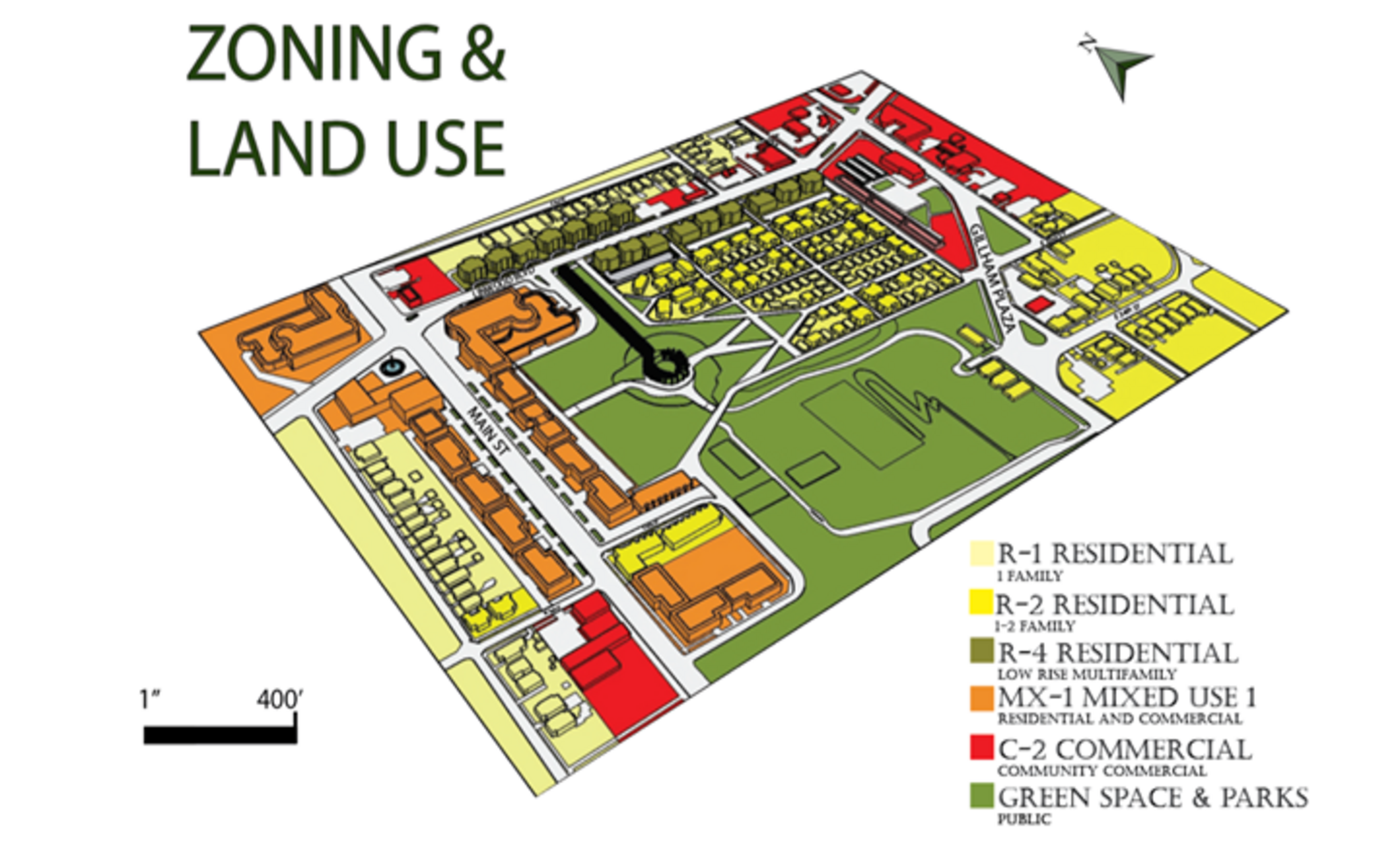
The project looked at redeveloping a popular intersection in Kansas City
Three seniors studying Urban Planning and Design at the University of Missouri-Kansas City School of Science and Engineering won the Nichols Student Prize for work on a fictional redesign of a Kansas City corridor.
The Nichols Student Prize recognizes students for developing innovative urban designs and developments as part of the UMKC Urban Planning + Design Program. This year, students were tasked with examing development at Main Street and Linwood Boulevard, a major corner along the extension of the KC Streetcar south line from Union Station to Westport.
Tianna Morton won the top prize for her design, "The Garden District." Morton's development focused on removing big-box retailers and instead replaced them with a mix of housing types and a new park.
"I felt that in place of Costco and Home Depot, what would benefit growth and promote accessible homeownership would be the addition of a new neighborhood," Morton said. "The neighborhood would consist of tiny homes, small single-family homes, duplexes and a small apartment building to accommodate a myriad of people."
Morton said the project was exciting for her as she used to live in Midtown near the fictional project's location.
"When it was announced that I had won, I was surprised and grateful," Morton said. "All the students proposed wonderful, creative and thoughtful projects."
In addition to Morton's win, Jazmin Bustos and Luke Bertram both took home second place in the competition.
The jury was impressed with Bustos's inclusion of community institutions, like a childcare facility and a library, as part of her plan for the site. Bertram's "appealing sense of urbanism" for a public square helped him place.
Jul 19, 2022
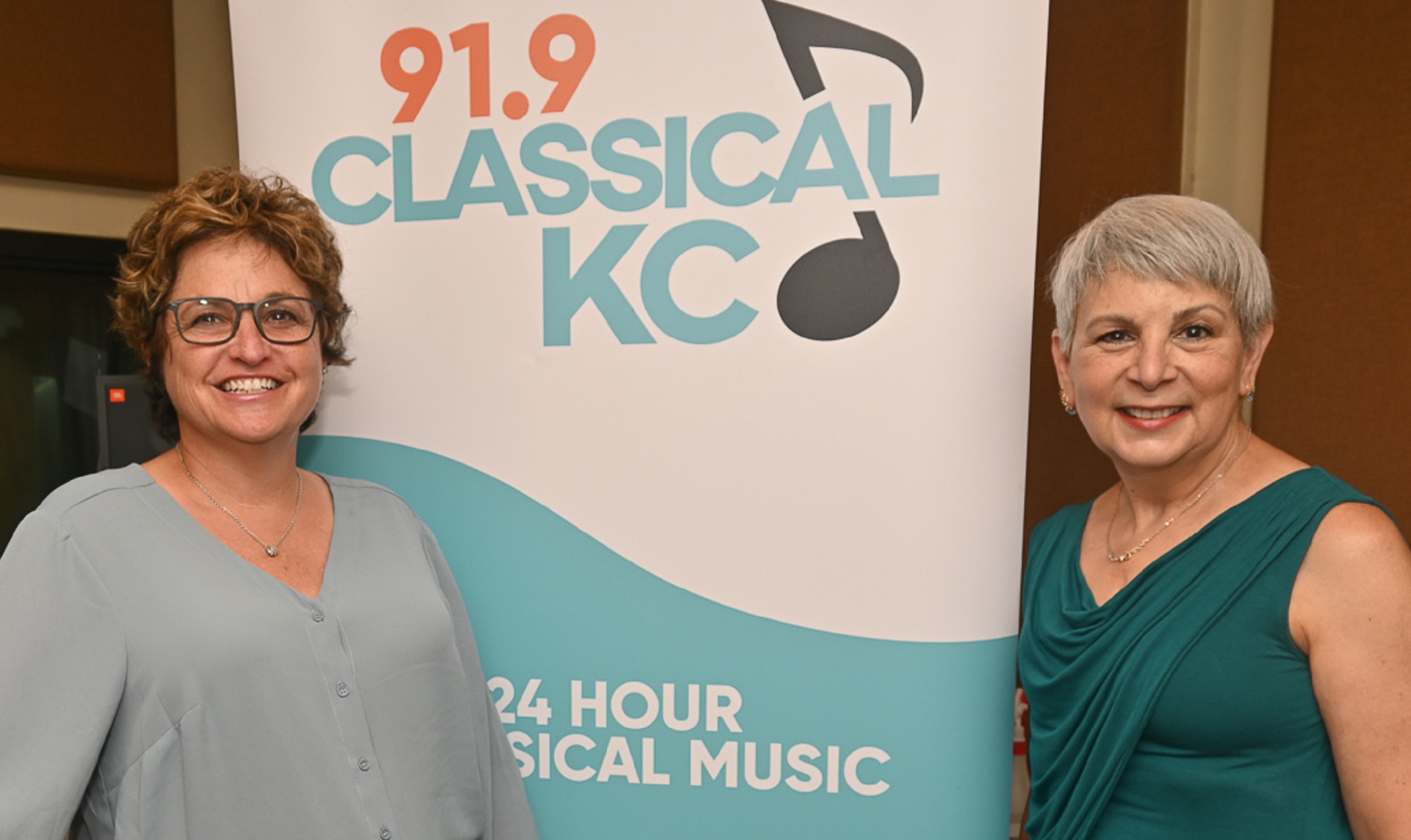
A lifelong love of classical music and original arts programming leads to endowment
UMKC Professor Emerita Linda Mitchell, Ph.D. grew up listening to classical music.
“We lived in the Philadelphia area, and we had wonderful classical music stations there, even before public radio,” she says. “I was a teenager when public radio started, and NPR’s programming became a lifeline for me.”
Mitchell, who has lived mostly on the east coast, was accustomed to having classical music available on the radio around the clock. She’s been in Kansas City since 2008 and has been a sustaining member of KCUR since she arrived. She relishes KCUR’s regular programming—especially Chuck Haddix’s Fish Fry—but missed that easy access to anytime classical music. So, when Mitchell learned about plans for 91.9 Classical KC, a sister station featuring classical music with a goal to create local programming that focused on the Kansas City culture and music scene, she was thrilled. That it launched in July of 2020, at the beginning of the COVID-19 pandemic, was a gift.
“It's not so much that classical music is always relaxing, but there's something about the cadences and structure and the technical aspects of classical music of all eras, that actually settle me down. It’s a wonderful accompaniment to work and a great thing to listen to as I fall asleep.”
While Classical KC’s regular programming was her original draw, Mitchell became more invested in the station once she found out that a goal of the station was to increase diversity in both staffing and programming selections. Already committed to supporting the station, conversations with the station’s development team led to her endowed gift supporting local programming.
“I think that philanthropy for public radio stations can be envisioned in two separate lanes. One is the bottom line fundraising – such as membership drives – that has to happen, but is focused on meeting immediate needs.”
Mitchell sees the other lane as long range solutions that provide security for institutions that create value for the community.
“The only way to do that is through endowments where the principal can grow and then the income can be used. With the growth of the fund, eventually it might replace some of that desperate fundraising that goes on every year.”
Mitchell sees an endowment as an optimistic testament that the organization is going to survive and thrive. David Fulk, director of philanthropic giving, confirms that gifts such as Michell’s do just that.
“The significance of Mitchell’s endowed fund is providing long term security for the station which, in turn, will ensure that future generations of listeners have access to local classical music programming,” he says.
Sarah Morris, general manager KCUR 89.3 and Classical KC 91.9, says support like Mitchell’s is essential to public radio in Kansas City.
“The vast majority of our funding comes from local donors like Linda, and we wouldn’t be here without them. Particularly with Classical KC, we rely on the people in our community with a passion for classical music who want to ensure that everyone has free access now—and in the future,” she says.
Mitchell sees herself as a pragmatist.
“This is the craziest center for art and culture I have lived in in my life,” Mitchell says. “Kansas City is bursting at the seams with all kinds of cultural events and spaces. It is actually a little overwhelming! It made sense that Classical KC wanted to tap into that energy and promote the diversity of the city as well the idea that classical music is for everyone.”
Jul 19, 2022
Larry Wigger spoke with KSHB about the surging demand
Local car dealers say thy are seeing an increase in electric vehicle sales in the face of rising gas prices.
Larry Wigger, an assistant teaching professor at the Henry W. Bloch School of Management, spoke with KSHB about the pros and cons of going electric. Read more
Jul 14, 2022
Dean Mary Anne Jackson, MD weighed in on rising COVID cases
The new COVID-19 variant, BA.5. is contributing to an increase of cases in the Kansas City area.
School of Medicine Dean Mary Anne Jackson, MD spoke with KCUR's Nomin Ujiyediin about the new variant and its impact. Read more
Jul 14, 2022
Beth Vonnahme, Ph.D., associate dean of political science and philosophy spoke with KMBC
According to new voter registration figures from the Secretary of State, more Kansas voters are opting not to affiliate with either major political party.
Beth Vonnahme, Ph.D., associate dean of political science and philosophy, spoke with KMBC about the increase in unaffiliated registered voters in Kansas and across the country. Read more
Jul 14, 2022
Fengpeng Sun, Ph.D. and Irma Russell J.D. weighed in on KCUR
Law Professor Irma Russell and Assistant Professor and Climate Scientist Fengpeng Sun, Ph.D. were guests on KCUR's Up To Date.
The pair dicussed the recent Supreme Court decision, which limits the Environmental Protection Agency's authority on limiting carbon emissions. Read more
Jul 14, 2022
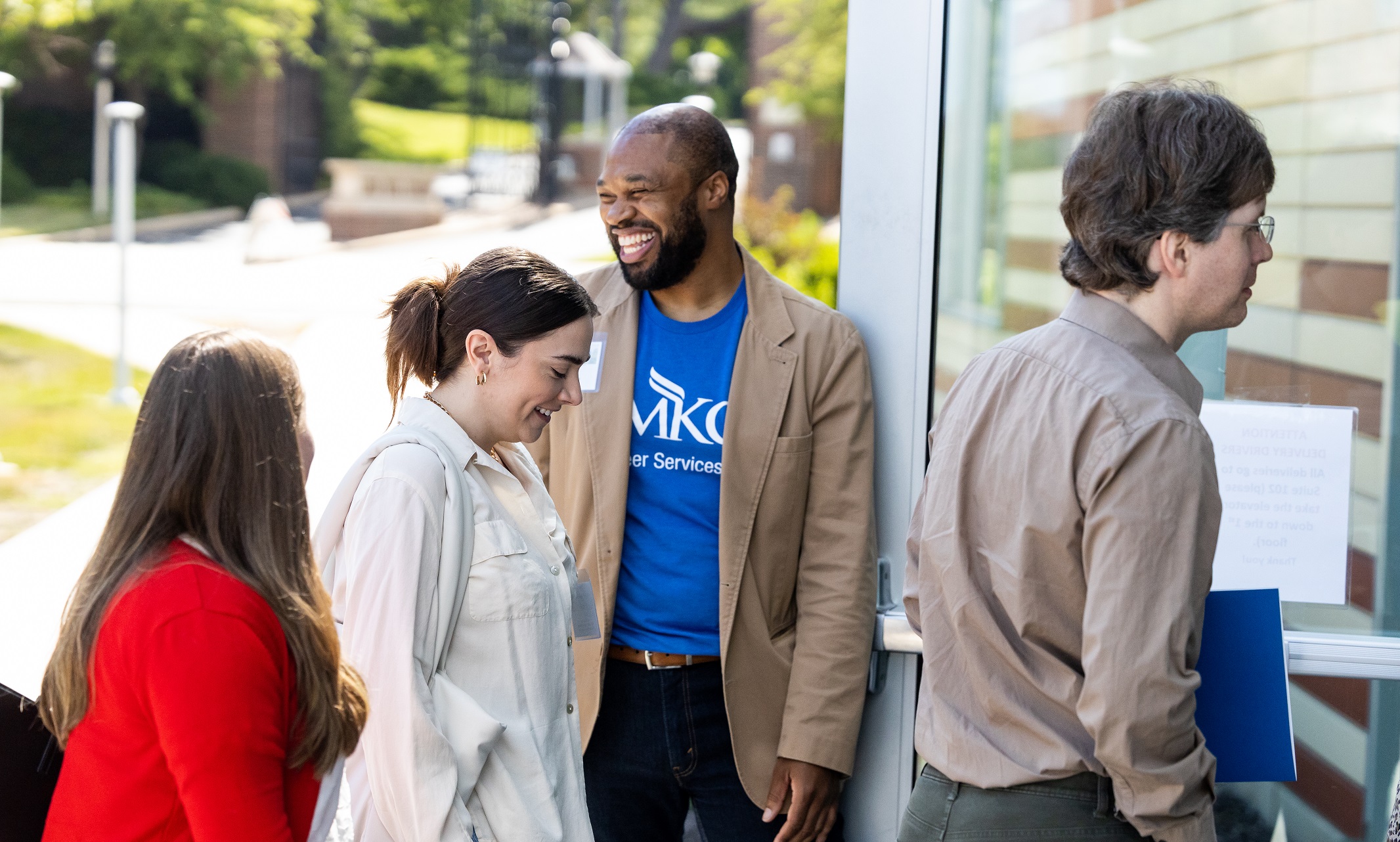
Nearly 200 people attended the summit to collaborate and learn about hiring the next generation of professionals
Connecting with this generation of students and young professionals may require thinking outside of the box. The KC Early Talent Summit hosted hiring professionals from more than 90 local companies and organizations to discuss the opportunities and changing landscape when it comes to hiring and working with young professionals.
Topics included diversity, equity and inclusion, recruitment and retention, building a recognizable brand on campus and alternatives to traditional internships.
“We hope this Early Talent Summit will benefit our students and organizations in town,” said Goldie Gildehaus, assistant director of UMKC Career Services. “We want to build talent pipelines and early connections between students and professionals to help everyone be successful.”
Several UMKC students and recent alumni had the chance to talk to attendees about the hiring process from a potential employee’s perspective. They noted how important communication and flexibility are to them, as well as the role that networking and career services can play.
“I was at Bloch Career Center all the time,” said Kyle Potts (BBA ’22). “I can’t count how many times they looked over a resume for me or connected me with someone they knew. The internship I got in college is actually one I heard about through them. You never know where you’ll learn about an opportunity.”
This is the first year UMKC has hosted the KC Early Talent Summit. It developed as a partnership between several UMKC entities, including Career Services, Bloch Career Center, the UMKC Board of Trustees and Professional Career Escalators.
Jul 14, 2022
One of the first times a Missouri institution has been awarded a graduate education and research grant from the NSF
The University of Missouri-Kansas City has received a $3 million grant from the National Science Foundation Research Traineeship Program to study and mitigate alcohol and drug abuse using AI and Secure Networked Sensing.
It is one of the first times a Missouri institution has been awarded a graduate education grant from the NSF.
"This is a fantastic project, not only for the research team and graduate-level students involved, but also for the university as a whole, which will receive national attention for this groundbreaking work," said Chris Liu, Ph.D., vice chancellor of research and dean of the School of Graduate Studies.
The research team will be led by Farid Nait-Abdesselam, Ph.D., a professor in the School of Science and Engineering, and includes Masud Chowdhury, Ph.D., Mostafizur Rahman, Ph.D., Dianxiang Xu, Ph.D., Yugyung Lee, Ph.D., Ahmed Hassan, Ph.D., and Yusuf Uddin, Ph.D., all professors at the School of Science and Engineering. The team will also include Ye Wang, Ph.D., Ryan Copus, Ph.D., Arif Ahmed, Ph.D., George Gotto IV, Ph.D., Martha B. McCabe, Arnold Abels, Ph.D., Brent Never, Ph.D., and Alexis Petri, Ph.D.
The project will hire and support 20 Ph.D./MS students and impacts over 100 additional graduate students. Students will come from several different programs across campus.
"Students involved in this research will be exposed to so many faculty members from different disciplines. Interdisciplinary study is extremely critical to our students in today's graduate education," Liu said. "This project is not only an opportunity to learn, but to expose students to a real-world research project to address crucial societal issues."
The research is slated to last at least five years and begin in July.
The NSF is an independent agency of the United States government that supports fundamental research and education in all non-medical fields of science and engineering. Yearly, the agency gives out roughly 12,000 new grants.
Jul 11, 2022
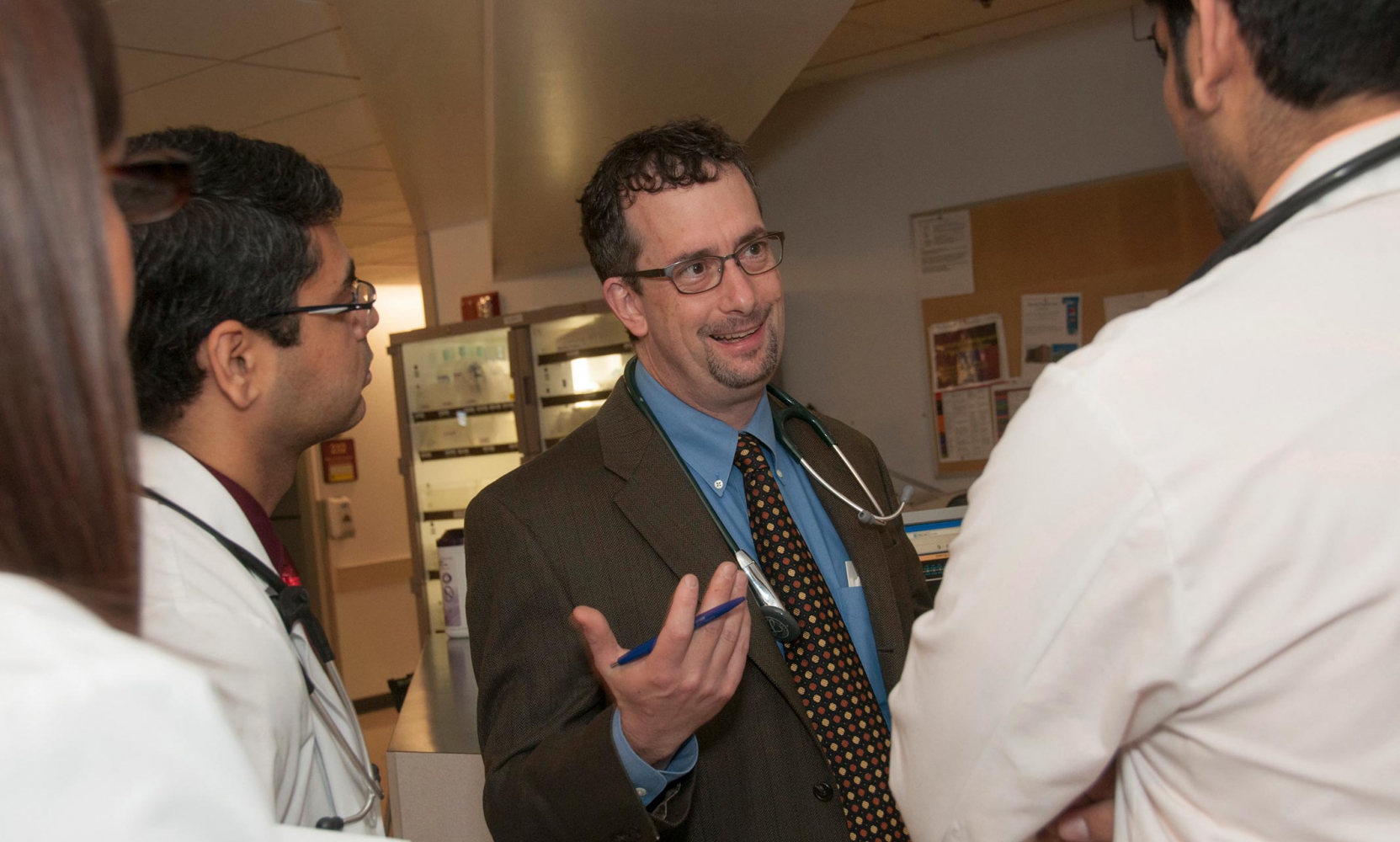
Grant for nearly $2 million will support formal training, mentorship and research experiences
The UMKC School of Medicine has received a nearly $400,000 grant from the National Institutes of Health to continue and build upon a successful two-year training program in clinically oriented cardiovascular disease outcomes research through the Department of Biomedical and Health Informatics and UMKC’s new Healthcare Institute for Innovations in Quality (HI-IQ). The funding covers the first of five years of support through the National Heart, Lung and Blood Institute, bringing the total grant funding to just less than $2 million.
Immense research investments have improved the care of patients afflicted with cardiovascular disease, the leading cause of death and disability in the United States. But continued evaluation of patient-centered outcomes, including patient symptoms, function and quality of life and how to apply that knowledge in clinical settings is needed, said John Spertus, M.D., professor, clinical director and endowed chair in metabolic and vascular disease research.“Collectively, our committed team will provide formal training, mentorship and research experiences for trainees to make significant contributions to the scientific literature, embark on successful academic careers, and improve the value and patient-centeredness of medical care,” Spertus said.Hands-on research is one of the key components of the program that provides a basic foundation in clinical research, including a master’s degree in bioinformatics with a clinical research emphasis, and specialized skills for outcomes research, coupled with academic survival skills.Hallmarks of the research experiences include multi-disciplinary group and individualized mentorship to meet each trainee’s needs, as well as access to numerous existing data. Clinical populations for primary data collection and implementation, training in entrepreneurship and highly experienced statistical support are provided to support trainees’ success.Program enhancements are also planned that include a more robust collaboration with the University of Missouri system, increased engagement in clinical trial design and a growing focus on implementation science with access to HI-IQ’s multistakeholder collaboration of 19 regional hospitals.
Jul 08, 2022
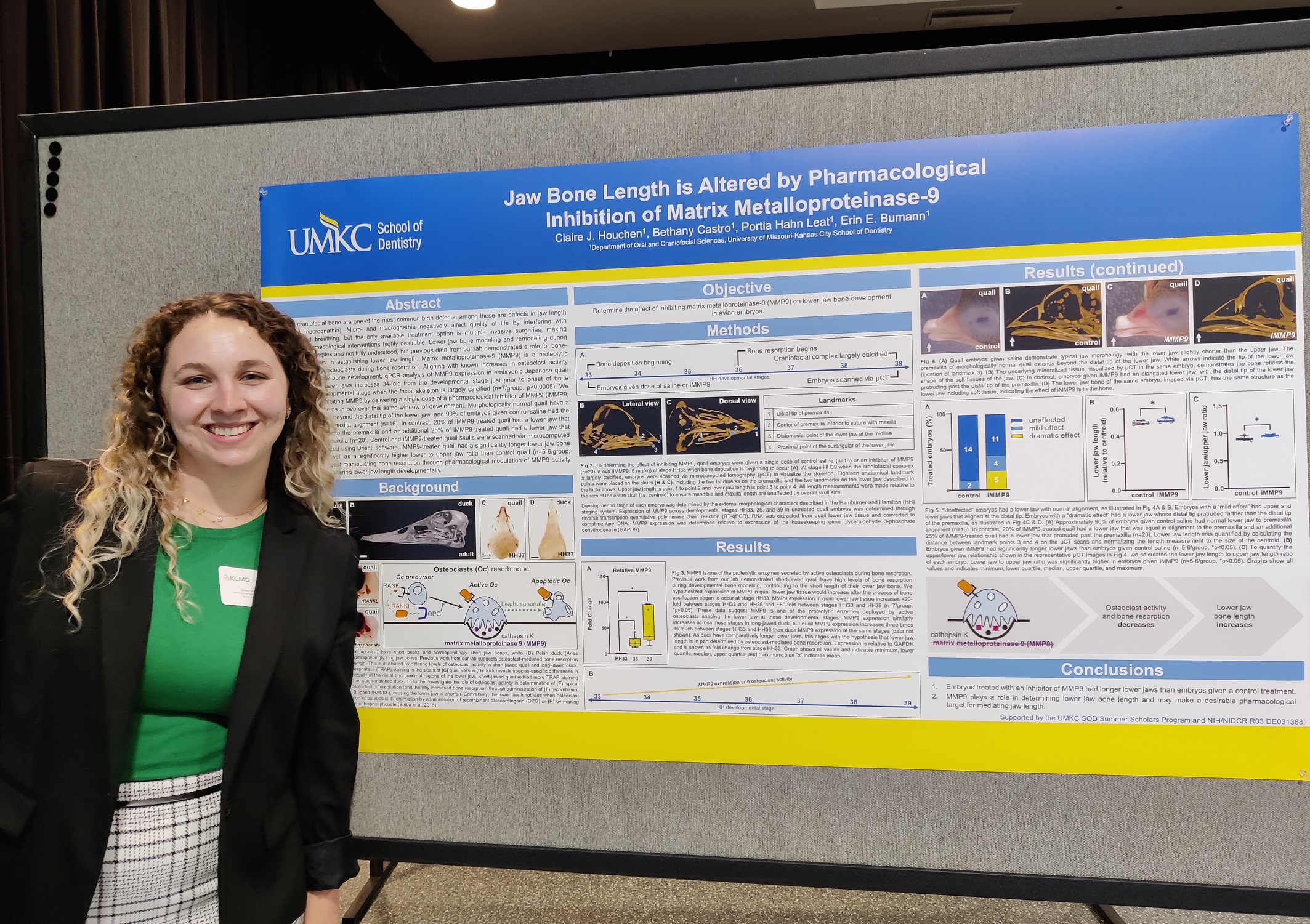
Student, professor share focus, outlook
Roos don’t just dream, they do. Our students turn ideas into action every day. Get to know our people and you’ll know what UMKC is all about.
Claire HouchenGraduation year: Spring 2024UMKC degree program: M.S. InformaticsHometown: Louisburg, Kansas
In the final year of her undergraduate studies, Claire Houchen was looking to expand her research experience. She recognized the value of mentorship early in her career, so she emailed a former professor who helped her make a valuable connection.
Houchen, M.S. bioinformatics ’24, was able to meet with Erin Bumann, D.D.S., Ph.D., assistant professor, Department of Oral and Craniofacial Sciences just before the COVID-19 pandemic shutdown.
“I had a good feeling,” Houchen says. “I felt like this was the right place for me and the right time.”
Bumann was impressed by Houchen’s accomplishments, which included working in a research lab immediately after high school.
Erin Bumann
“You could tell that Claire was someone who was really ambitious, dedicated and interested. All of those things are very important when getting started in a research lab,” Bumann says.
Bumann had mentors who were instrumental to her success when she was a student.
“Without the mentorship I received during my undergraduate studies, dental school and post doctoral training, I wouldn’t be in the position that I’m in today,” Bumann says.
Both women agree that a strong connection between the mentor and mentee is important to the relationship.
“Dr. Bumann and I have a constant flow of conversation,” Houchen says. “We are always talking about everything related to our careers. I think this impacts my professional journey as well as my educational one.”
Bumann notes that one of the keys to a successful mentor/mentee relationship is that both sides are willing to invest significant time and focus to make the experience successful.
“Compassion, honesty and an investment in growth are important, and I think that needs to come from both sides,” Bumann says. “And this is true of Claire, but in general one of the most wonderful things about having students in the lab is the energy it brings.”
Despite the camaraderie, biomedical science is challenging. Mentor support can make a difference.
“When we’re doing experiments on the bench, failure is inevitable and that’s tough,” Houchen says. “Sometimes it’s discouraging and overwhelming, but you learn from it and move forward. In addition, navigating science culture can be challenging, especially if your position is underrepresented. At times, I think the way that Dr. Bumann challenges me is just by telling me to hang in there. It’s easier said than done, but it’s helpful to have someone walk you through what it looks like.”
While there are formal mentoring programs in place, Bumann encourages students not to wait for a professor or someone else to suggest it.
Clare Houchen
“Lots of people are willing to mentor students, but the student may need to initiate. Just put yourself out there. You never know how a mentoring relationship might change your life.”
Houchen has reached out to potential mentors throughout her education. She agrees that students may need to take the initiative, but they are likely to benefit.
“As an undergraduate I had a biology professor who I respected. I really enjoyed talking to her and would go to her office hours. I’m still in touch with her.”
Bumann has witnessed Houchen in the mentoring role as well.
“Claire helps the undergraduates in the lab with their projects, so not only is she growing from mentoring herself, but she is taking it to the next level and being a mentor for others.”
Jul 05, 2022
Part of the funding was appropriated by the state
The University of Missouri-Kansas City unveiled plans for a new $100 million addition to its Health Sciences District.
This new project will take the Health Sciences District to the next level, sparking development to turn the campus into a regional draw while igniting entrepreneurship and economic growth for the city and region.
Read more
Jul 05, 2022
